A Day in Belmullet, County Mayo: The Edge of Ireland
There's something almost electric about Belmullet, County Mayo Ireland, that salty mix of sea breeze, laughter spilling from local pubs (I highly recommend McDonnell's!). It's the kind of quiet beauty that makes you stop mid-step to take it all in. Belmullet town is perched in north Mayo, between Broadhaven Bay and Blacksod Bay. Indeed, this friendly town is the beating heart of the Erris Peninsula.
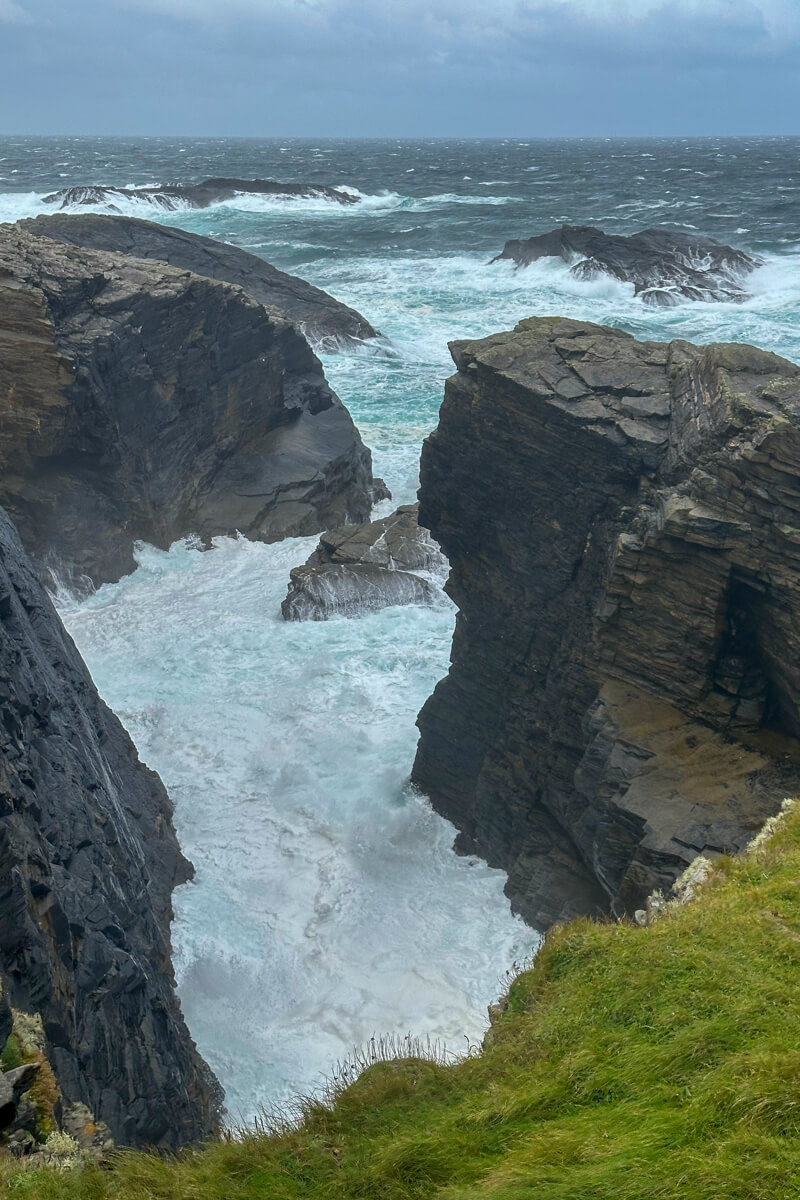
The region boasts dramatic sand dunes, rugged landscapes, and breathtaking views of the Atlantic Ocean. This makes it a standout destination along Ireland's Wild Atlantic Way. Belmullet is nestled within the Erris region, one of Ireland's most scenic areas.
In fact, Belmullet is also officially designated as part of the Gaeltacht, an area where Irish language is widely spoken. It is most definitely an Irish speaking town, along with English, and I invite you to practice some basics! In my next post, I'll share more about my Irish language lesson on Achill Island. Be on the lookout for some phrases to practice!
Údarás na Gaeltachta
Before I go any further, a huge thank you to Údarás na Gaeltachta, who sponsored my Mayo journey. They support culture, community, and the Irish language across Ireland's Gaeltacht regions.
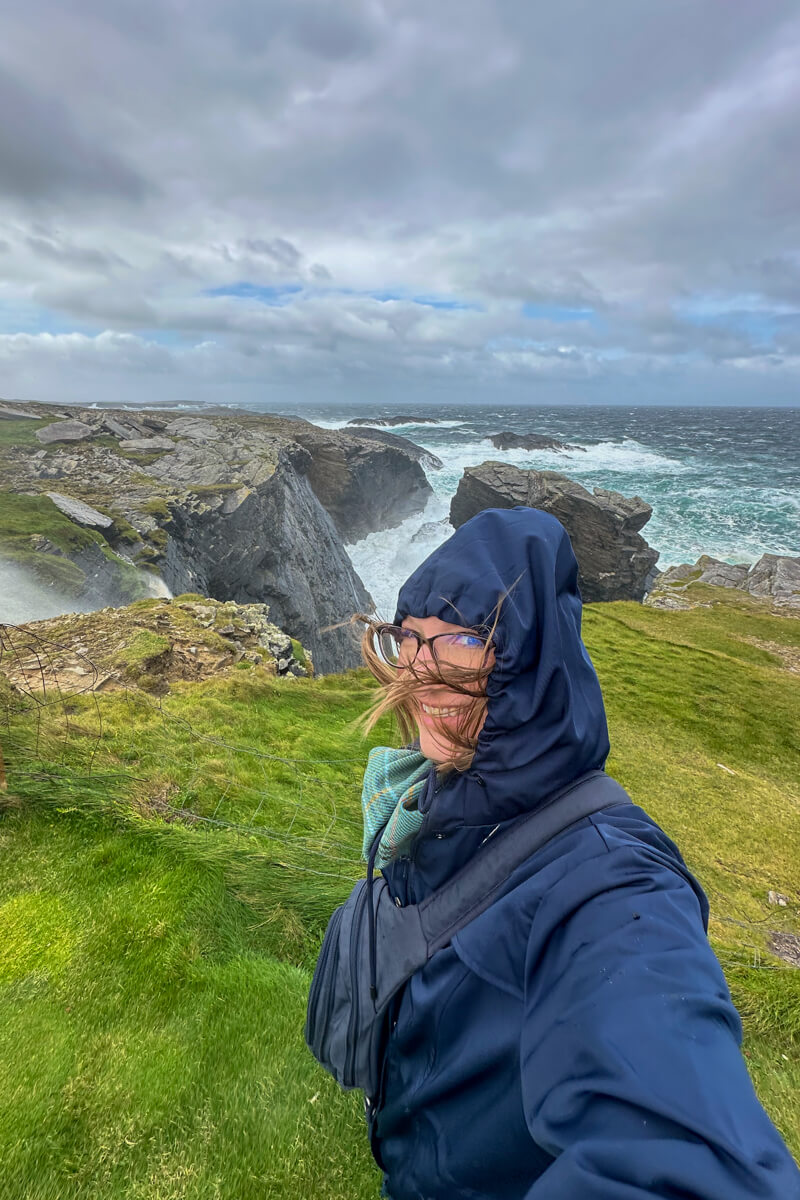
Why Belmullet County Mayo?
This is a place made for explorers. In just one day, you can swim in a tidal pool, stand on cliffs where the Atlantic crashes against the edge of Europe, wander through ancient ruins, and enjoy fresh-caught seafood with a view of the bay. Whether you're into lighthouses, island tours, or just long scenic drives where sheep outnumber cars, Belmullet is your perfect base. The area plays host to visitors from all over, offering a warm welcome. It serves as a hub for the Carne Golf Links, cultural events, and outdoor adventures in the Erris region.
This post is Part 2 in my County Mayo series, and it's all about how to make the most of your time in and around Belmullet. If you missed it, read Part 1 that includes my experience at the Carne Golf Links. Also, Part 3 is all about Achill Island.
Here's what I did in the Belmullet area, what I wish I'd done, and how you can plan the perfect day (or two) at the far edge of Ireland. If you're looking for reasons to visit Belmullet, you'll find plenty of inspiration here.
Jump to:
Belmullet Tidal Pool | Breakfast at The Talbot Hotel | Dún na mBó & Eagle Island | Cross Abbey & Cemetery | Solas Visitor Centre | Glosh Tower | St. Deirbhile's Story & Grave | Blacksod Lighthouse & Link to D-Day | Inishkea Islands | Reflections | Practical Travel Tips | FAQs | What's Next?
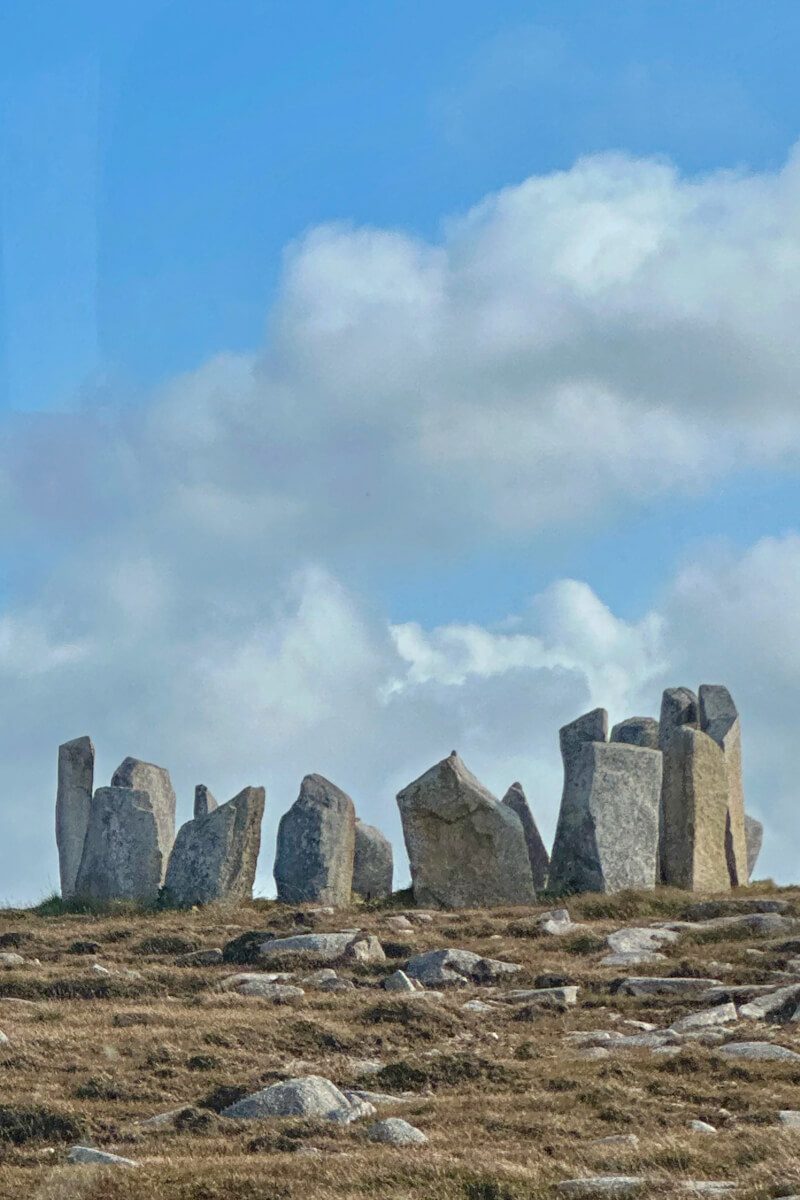
👉 Need help planning your trip from start to finish? Check out these useful links:
- Cheap Flights: Score great deals on airfare.
- Accommodation Savings: Find affordable stays from hostels to luxury hotels.
- Budget Car Rentals: Get great rates on car rentals. I like Expedia as well.
- Travel Adapter: All-in-one adapter for hassle-free charging.
The Belmullet Tidal Pool: A Chilly Dip with a Warm Welcome
It was one of those mornings where the wind cuts straight through you. It's the kind that makes you seriously question every life choice leading up to standing beside a freezing tidal pool in Ireland.
The Atlantic roared nearby, and the air was crisp enough to qualify as "sharp." I passed a group of locals, their welcoming attitude on full display. Then there was the German couple who had already taken the plunge and were grinning like it was a perfectly normal thing to do before breakfast.
Meanwhile, there I was, standing in my swimsuit, staring at the icy water, wondering if I'd completely lost my mind.
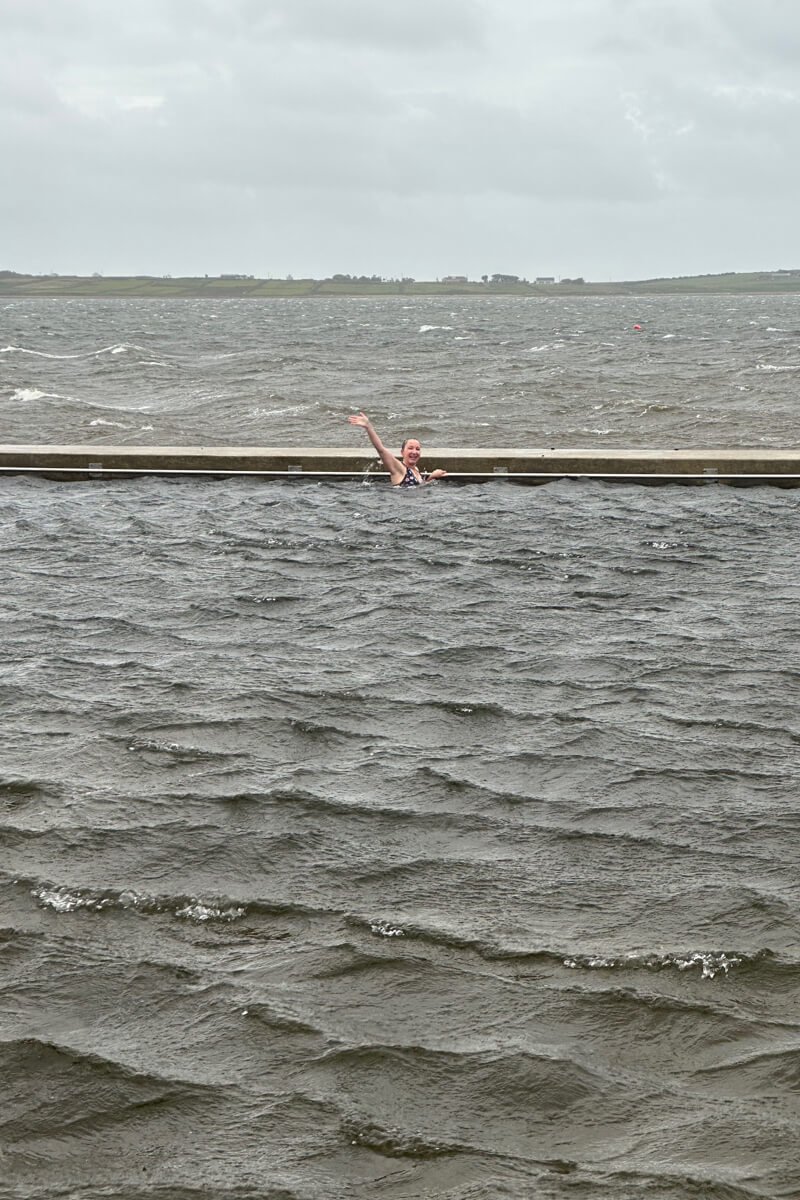
But somehow, I decided to go for it. Maybe it was the peer pressure, maybe the thrill of being in Ireland, or maybe just a temporary lapse in judgment, but I jumped in and started a lap across the pool.
The cold hit like an electric jolt. Every nerve in my body yelled, "Nope!" Halfway through, I genuinely wasn't sure if I'd make it back. But I did. Barely.
Did I enjoy it? It was hard to say in the moment, "survive" might be the more accurate word. But would I do it again? Absolutely.
It was invigorating, hilarious, and somehow empowering. It was one of those experiences you laugh about later with the others who braved the same madness. We didn't just swim that morning; we earned our breakfast, our bragging rights, and a new favorite travel story.
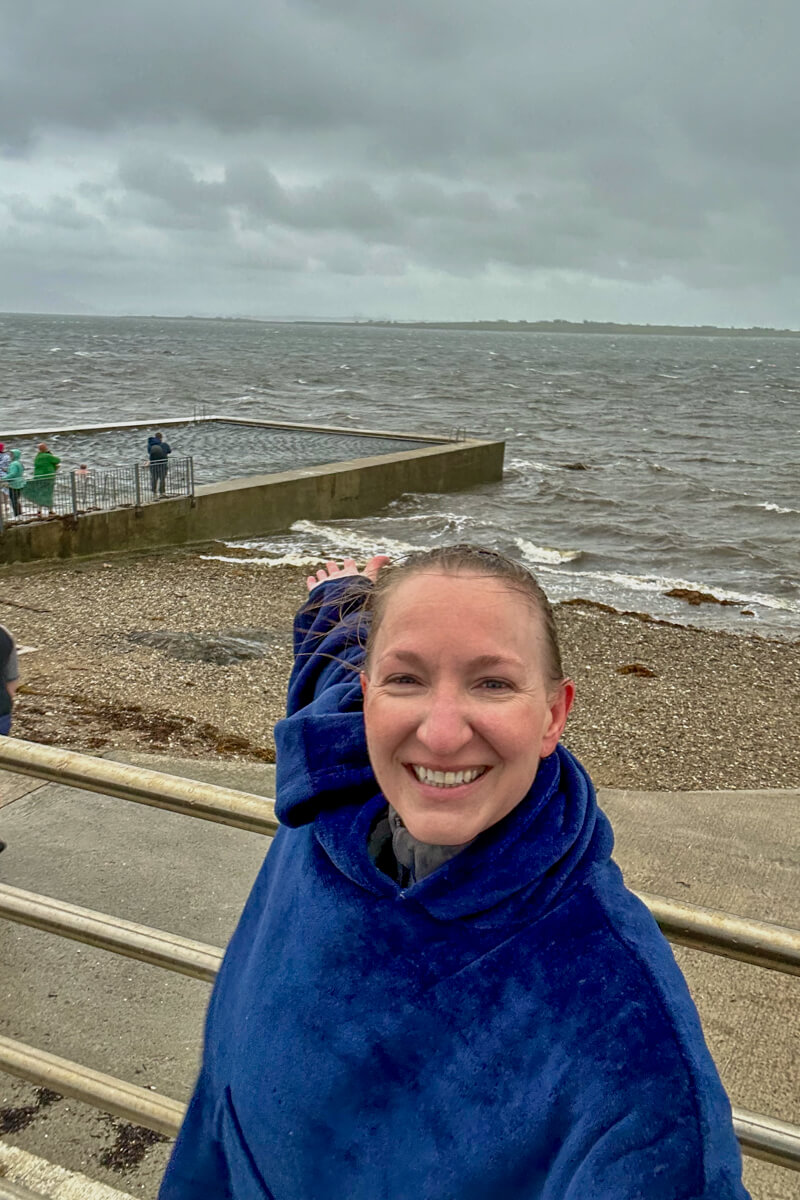
Breakfast at The Talbot Hotel, Fuel for a Wild Atlantic Day
After that dip, I needed something hot and some good protein. Thankfully, The Talbot Hotel delivered in true Irish hospitality fashion: steaming tea, a full breakfast, and great service.
You can't beat it: eggs Benedict on traditional brown bread (yes, I splurged!), a cozy setting, and the delicious mug of Irish tea.

Eagle Island: Waves, Wind, & Stories
Our next stop took us to the coast for a windswept view of Eagle Island Lighthouse, a lonely beacon situated just offshore against the endless Atlantic. The sea roared, the clouds raced, and the light caught on the white tower. It made it look both defiant and graceful.
Fergus, our guide, shared stories passed down through his family. His father once worked at Eagle Island, tending the light in weather that could shake the very walls. He painted such a vivid picture that I could almost see it. The isolation, the rhythm of the waves, and the smell of salt-soaked air clinging to everything.
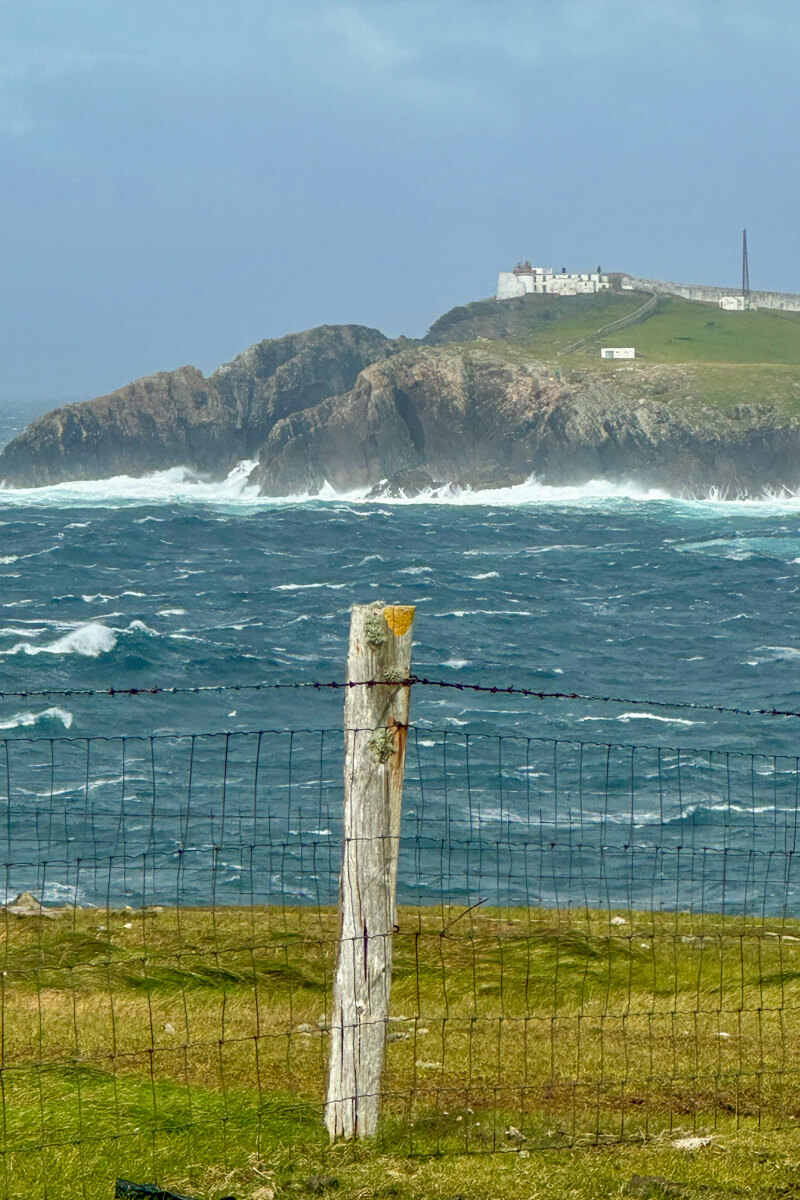
Then he told a story that had us all laughing, about the days when entire families lived at the lighthouse. When it came time for a deep clean, the mothers would tie their children to the fence outside. Why? To keep them from wandering off the cliffs or getting into mischief while the chores were done. Practical, effective, and very Irish.
Dún na mBó
From there, we continued on to Dún na mBó, where the Atlantic puts on a show of pure power. The cliffs stretch wide and wild, and the wind? Let's just say it's a full-body experience. The blowhole roared like thunder, sending bursts of mist and spray high into the air as waves crashed beneath us.
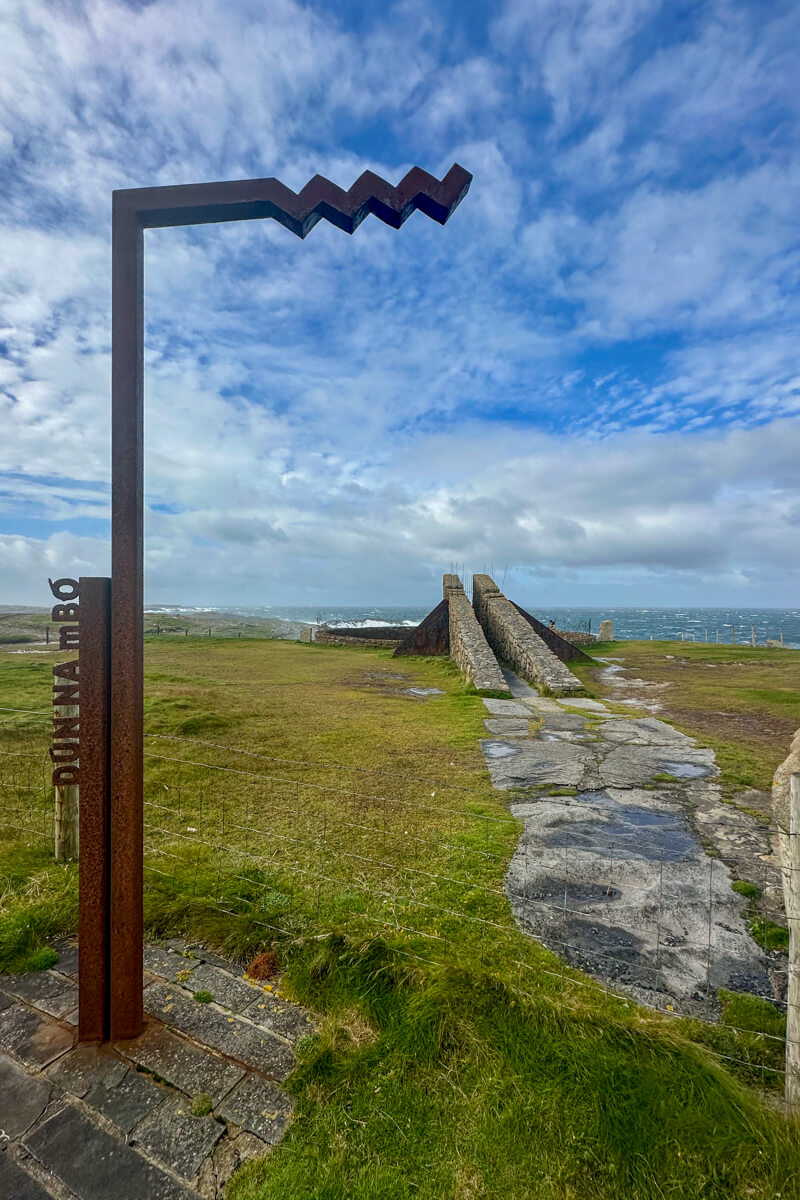
It's one of those places that silences you, not out of fear, but awe. Standing there, hair whipping in every direction, salt on your lips, you can't help but feel small… and completely alive.
The sheer force of the ocean is humbling. You realize how little we truly control, and yet how lucky we are to witness it. It's impossible not to feel grateful to the sea, to the wind, and to the people who've lived alongside both for generations.
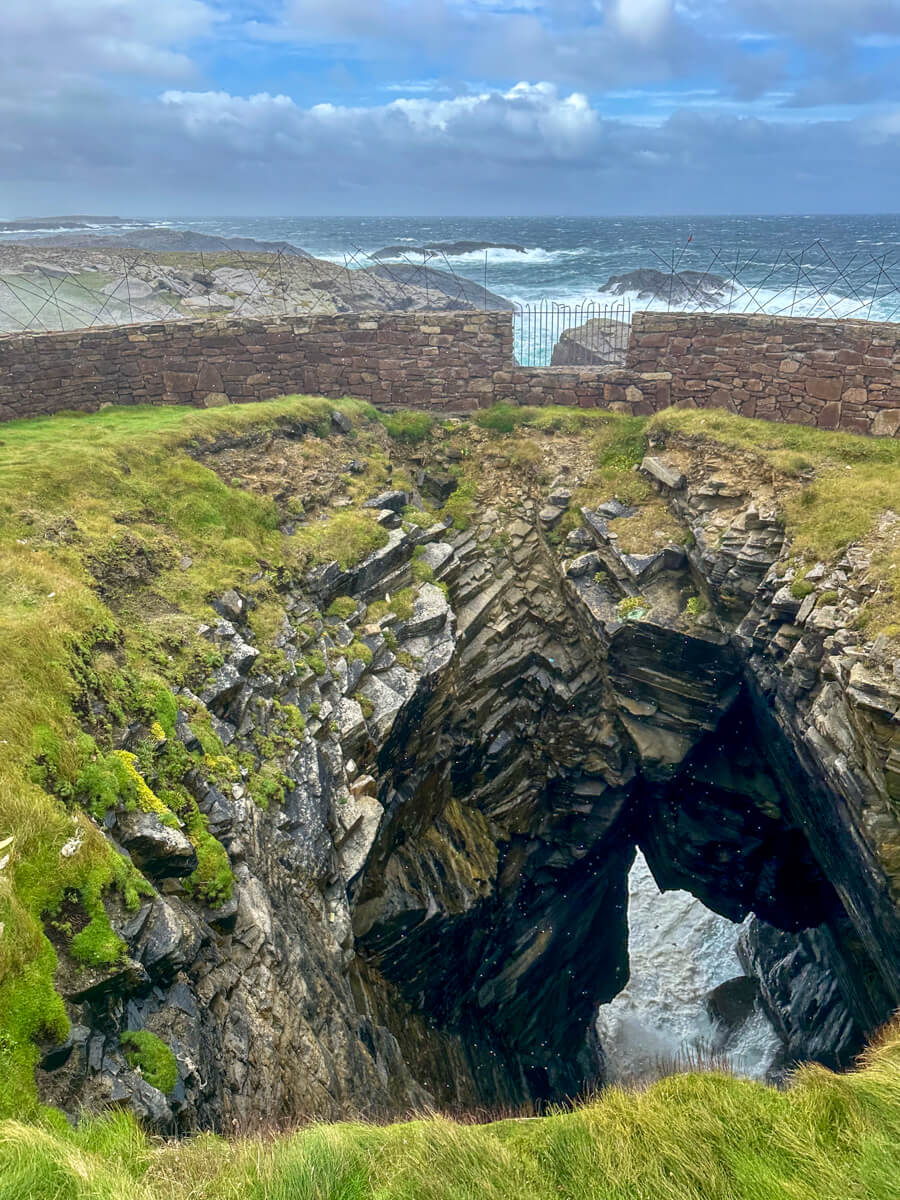
Exploring Benwee Head
Located on the Dún Chaocháin Peninsula in north County Mayo, Benwee Head (Binn Bhui) is known for its dramatic cliffs and rich Irish heritage. The nearby Stags of Broadhaven are a cluster of four steep, rocky islands about two kilometers offshore. They're important nesting grounds for seabirds and a striking sight from the headland. Tourists can explore the region using the Carrowteige walking trails, a network of well-marked coastal routes.
Along one of these trails, you'll find the Children of Lir sculpture, part of the Tír Sáile Sculpture Trail. This tells the story from Irish mythology of four children turned into swans and fated to wander the seas for 900 years. The paths also pass features like the old "black ditch," an ancient dry boundary that likely marked land divisions centuries ago.
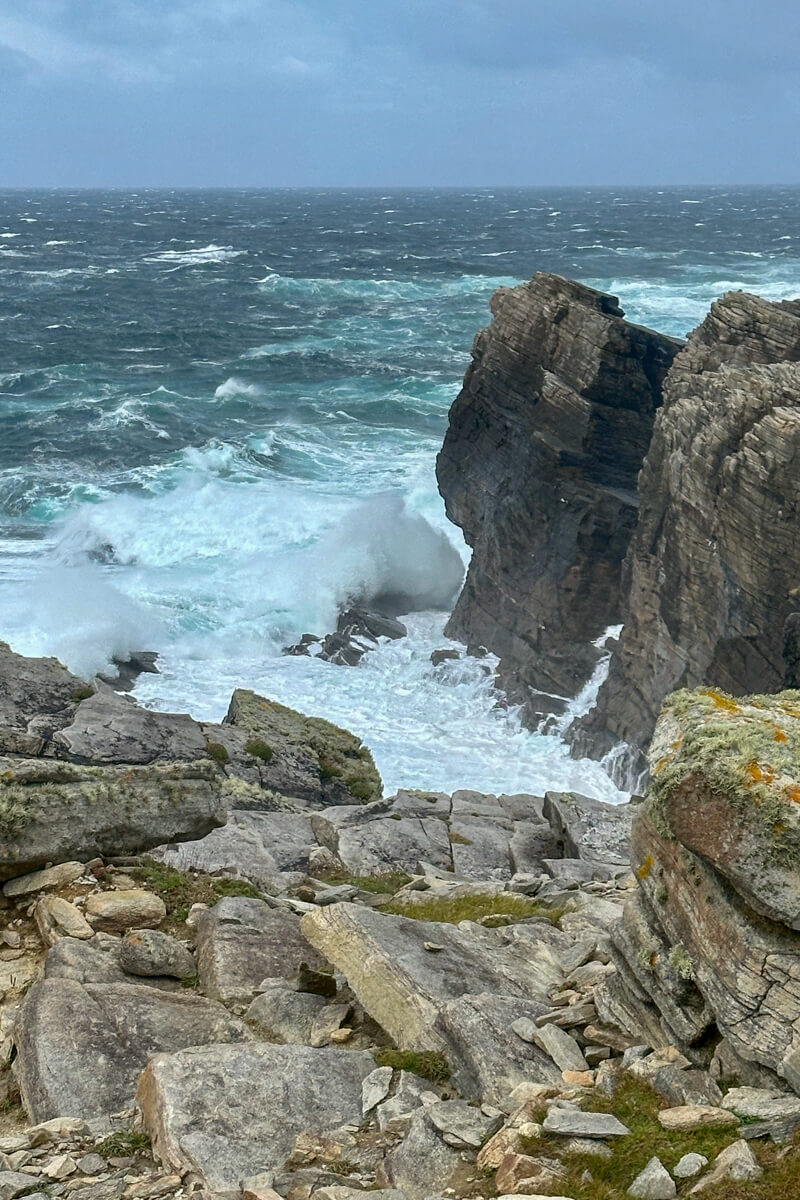
Cross Abbey and Cemetery, Quiet Stones, Lasting Stories
If you love a good quiet moment of reflection between adventures, Cross Abbey is perfect. This historic site sits close to the water, surrounded by old Celtic crosses and weathered gravestones.
It's peaceful here, wind through the grass, seabirds overhead, and the occasional wave breaking against the rocks. Places like this remind me why I travel: to slow down, connect, and listen to the history beneath my feet.
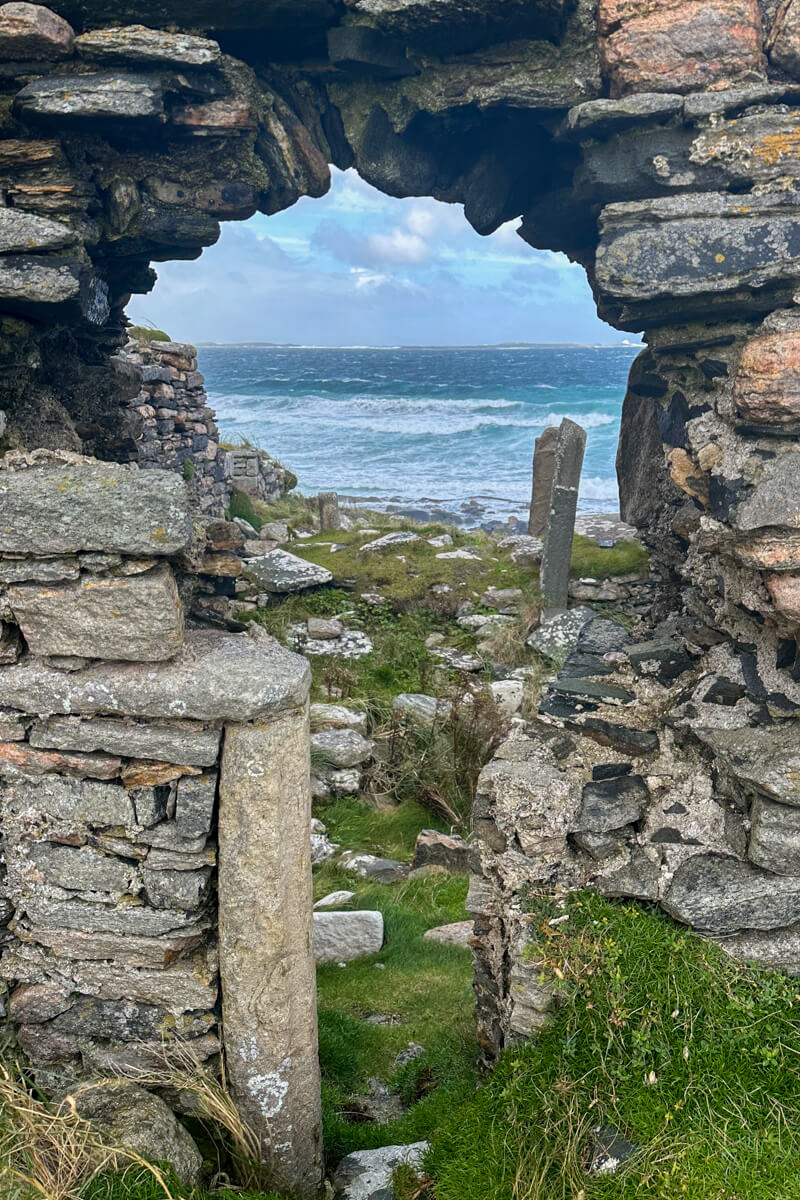
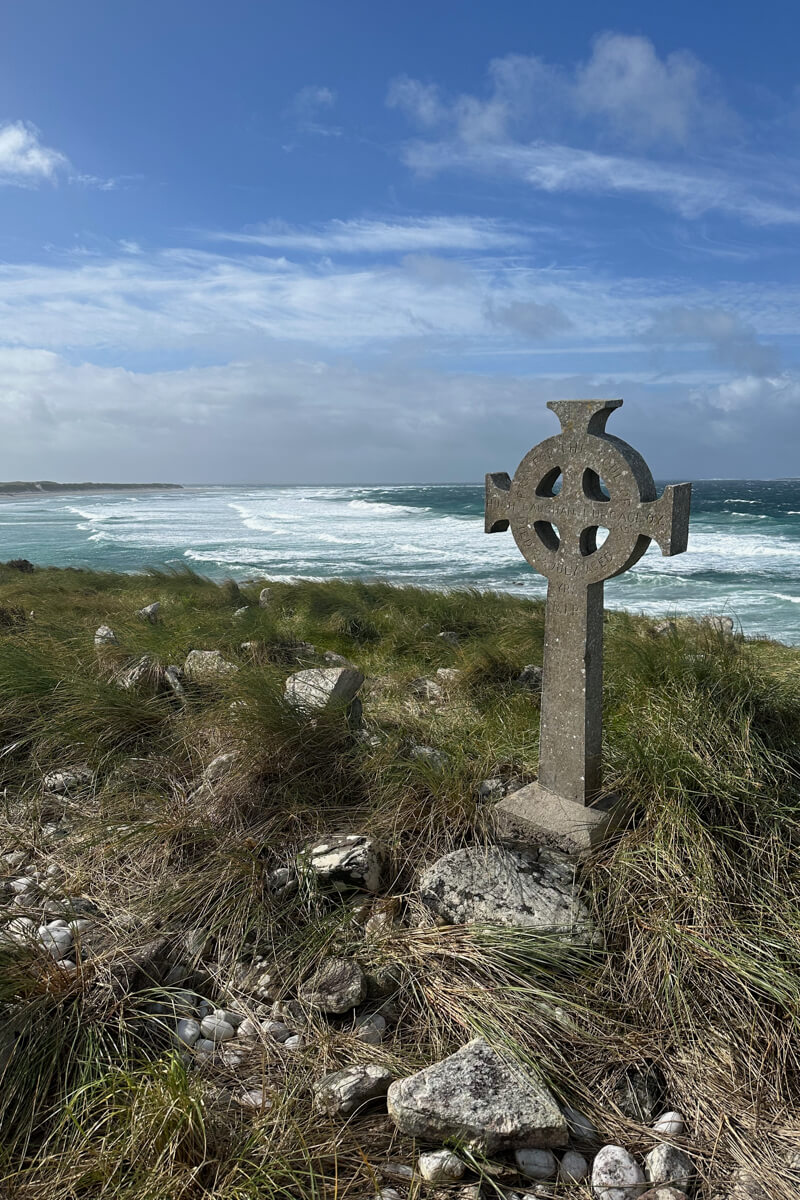
Lunch at the Solas Visitor Centre, Warmth, Quiche, and Creativity
By the time we reached the Solas Visitor Centre, the Atlantic wind had worked its magic, cheeks pink, hair thoroughly wind-styled. Thankfully, Solas was exactly what we needed. It's a place that feels like you've stepped into the heart of the Erris community.
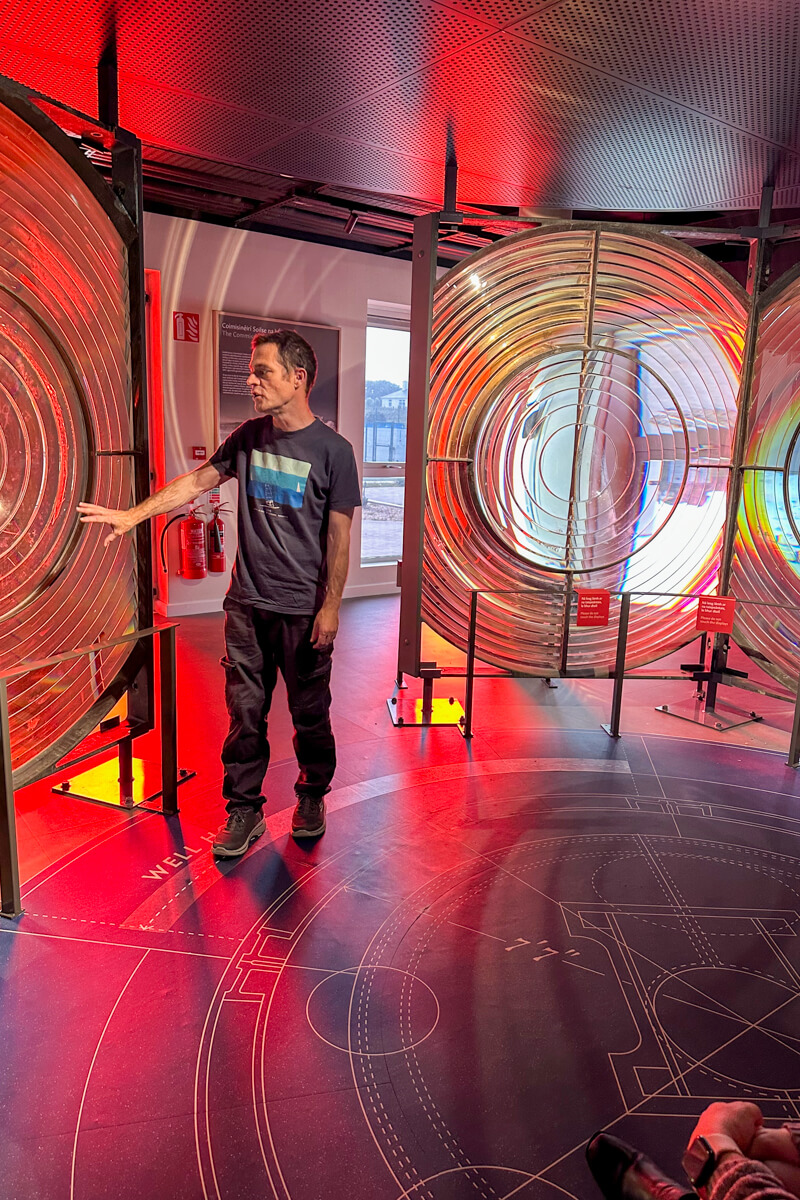
Inside, it's bright, modern, and full of life, a welcoming mix of art gallery, heritage exhibition, and café. The centre also serves as a host for local exhibitions and community gatherings. This makes it a vibrant hub for the area.
You can wander through displays on the area's rich maritime and fishing history and local traditions. It's the fascinating story of life along this wild stretch of the Wild Atlantic Way.
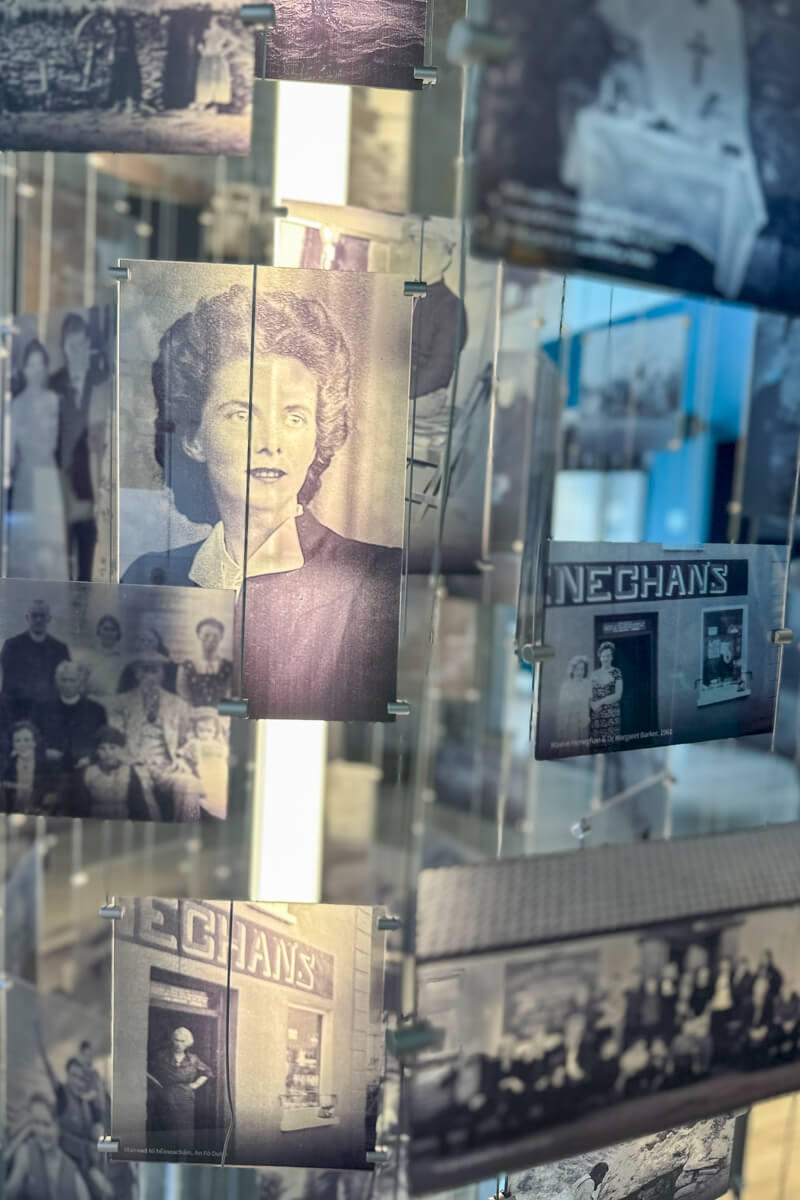
The galleries are full of surprises, from photographs of lighthouse keepers and fishing families to beautifully crafted woodwork, textiles, and ceramics by local artists. Each piece tells a story about the people who've called Erris home, braving the elements with creativity and resilience.
Lunch at Solas
And then, of course, there's the food. I ordered a slice of quiche with salad, followed by a pot of hot tea (because at this point, tea had become my emotional support beverage). Everything tasted homemade and hearty. You know, a meal that feels like it's giving you a hug from the inside out.
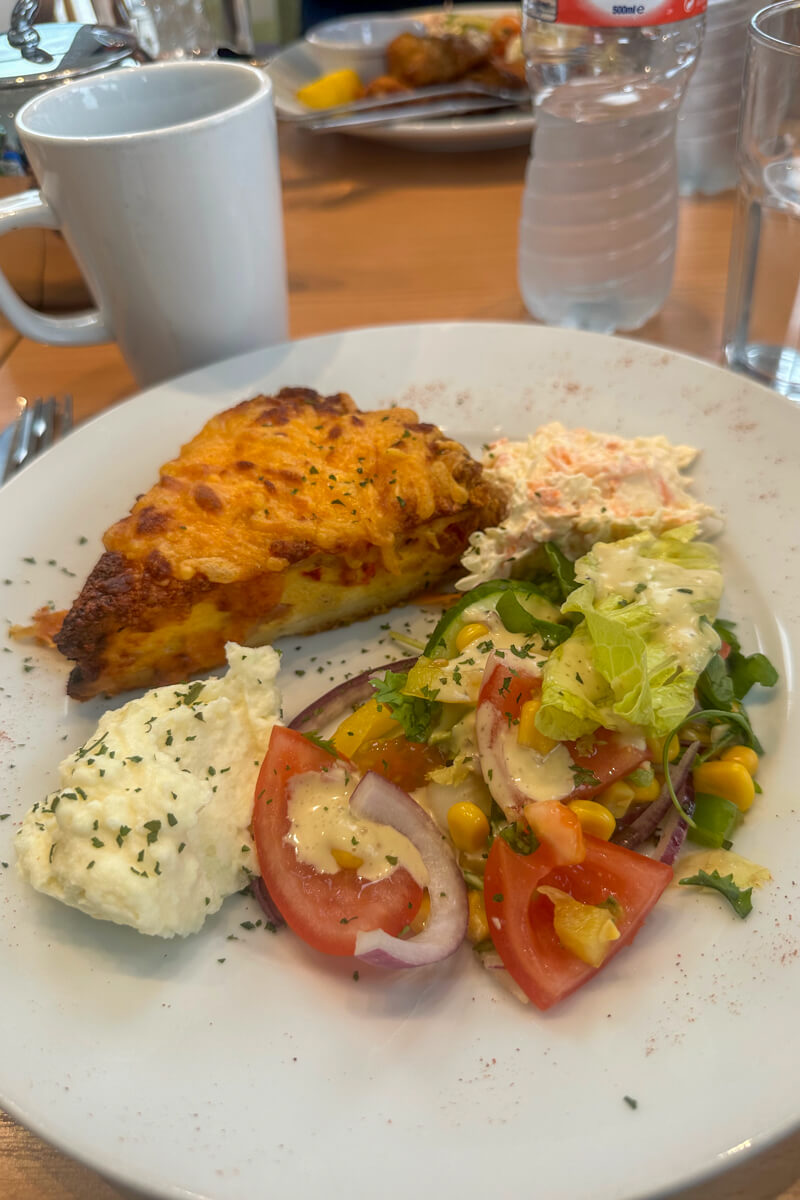
Solas means "light" in Irish, and it's the perfect name. Between the warmth of the café, the glow of creativity in the galleries, and the bright spirits of everyone we met, the place lives up to its name beautifully.
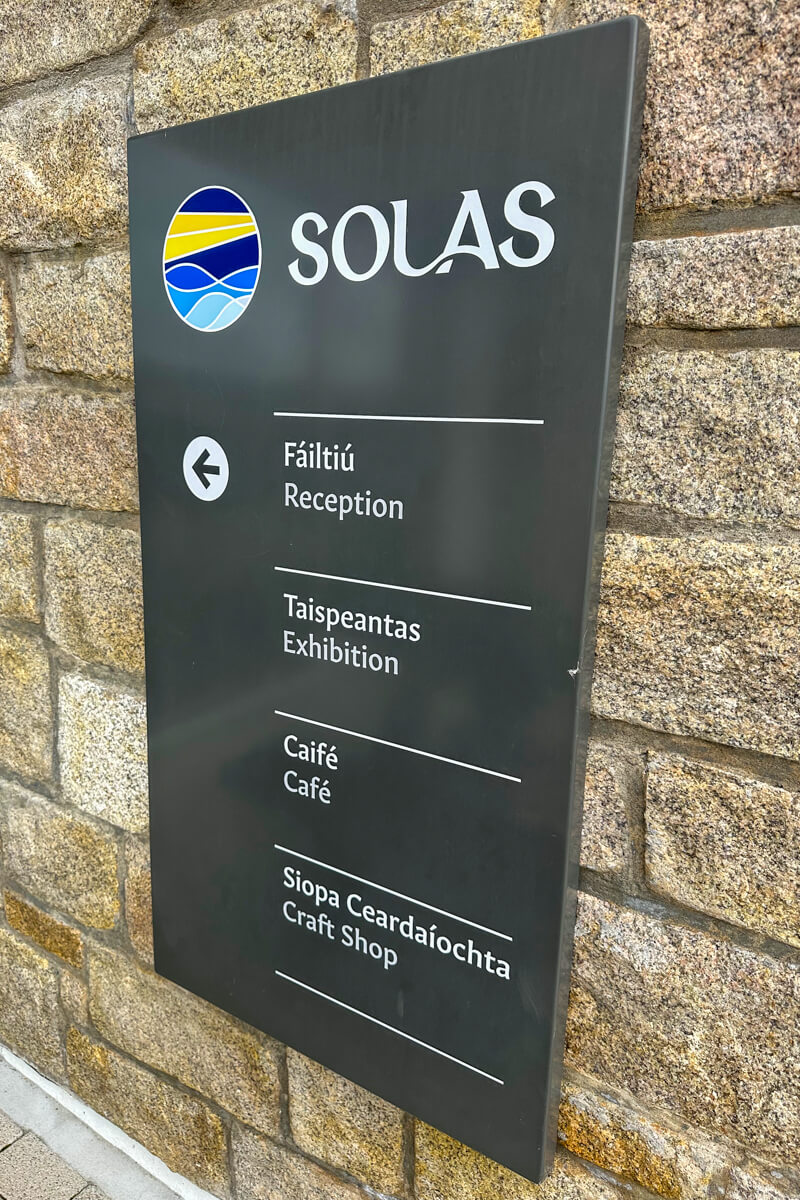
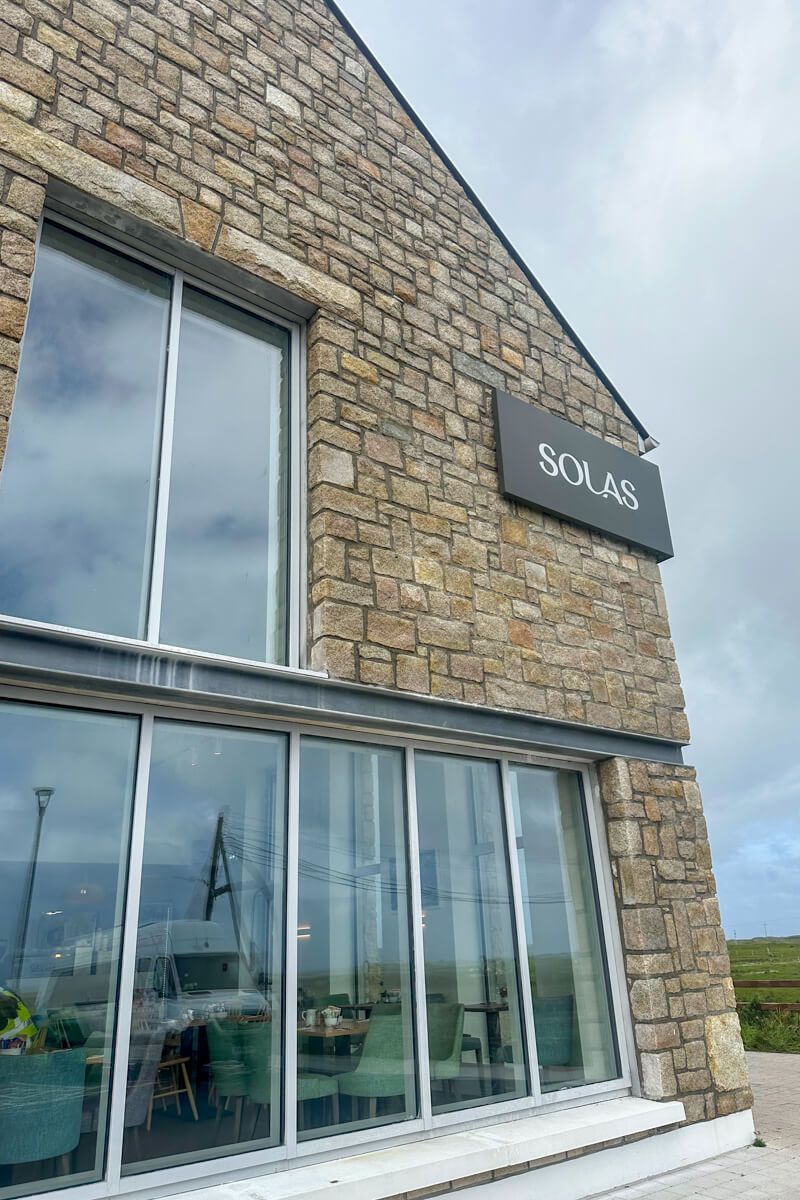
Glosh Tower, Standing Watch Over the Atlantic
Further out along the windswept coast of Fallmore stands Glosh Tower. It's a Napoleonic-era signal tower that has been silently watching over the Atlantic for more than two centuries.
Walked all around it, tracing its weathered stone walls and taking in the view it commands. Standing there, it's easy to imagine what it must have been like when the tower was built in the early 1800s. It was part of a whole chain of lookout towers along Ireland's western coast.
The air was wild and full of energy, wind that whips your hair straight back and makes conversation more of a shout than a chat. Looking out at the sea, I could almost see a lone watchman in a heavy wool coat. Just as if he were standing on the roof centuries ago, scanning the horizon for any sign of sails.
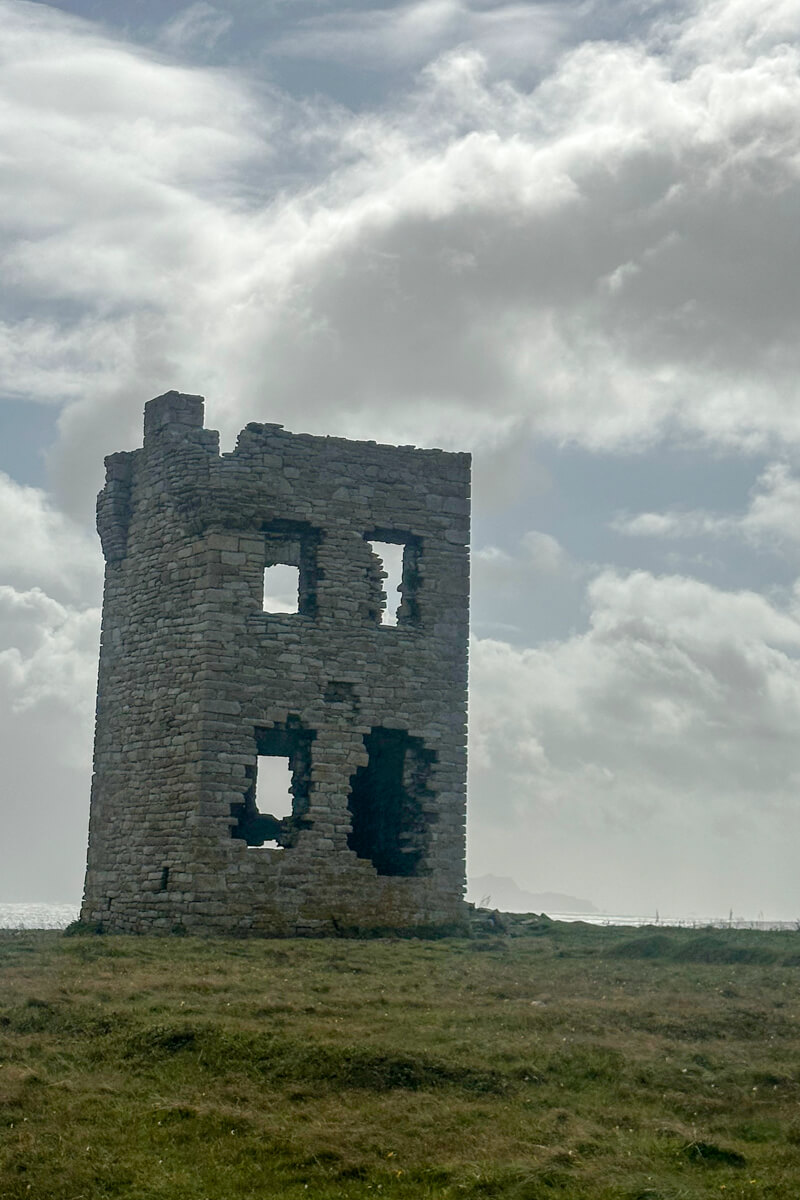
The History of Glosh Tower
Back then, the British feared an invasion by Napoleon's forces. Towers like this were built to relay warning signals along the coastline. The method was simple but ingenious.
If one tower spotted an approaching ship, a flag or ball signal was hoisted high. That way it would be visible to the next tower down the line. And then, just like in the Lord of the Rings, news could travel faster than any messenger on horseback.
Whether Glosh Tower ever had to send up a real warning flag is uncertain. Some towers saw little action, but just imagining the tension of those watchful days brings history vividly to life.
Today, the tower stands as a reminder of Ireland's long and layered relationship with the sea. It's a a symbol of vigilance, resilience, and endurance. Walking around it, surrounded by cliffs, wind, and endless waves, I felt connected to all those who've looked out from this same spot.
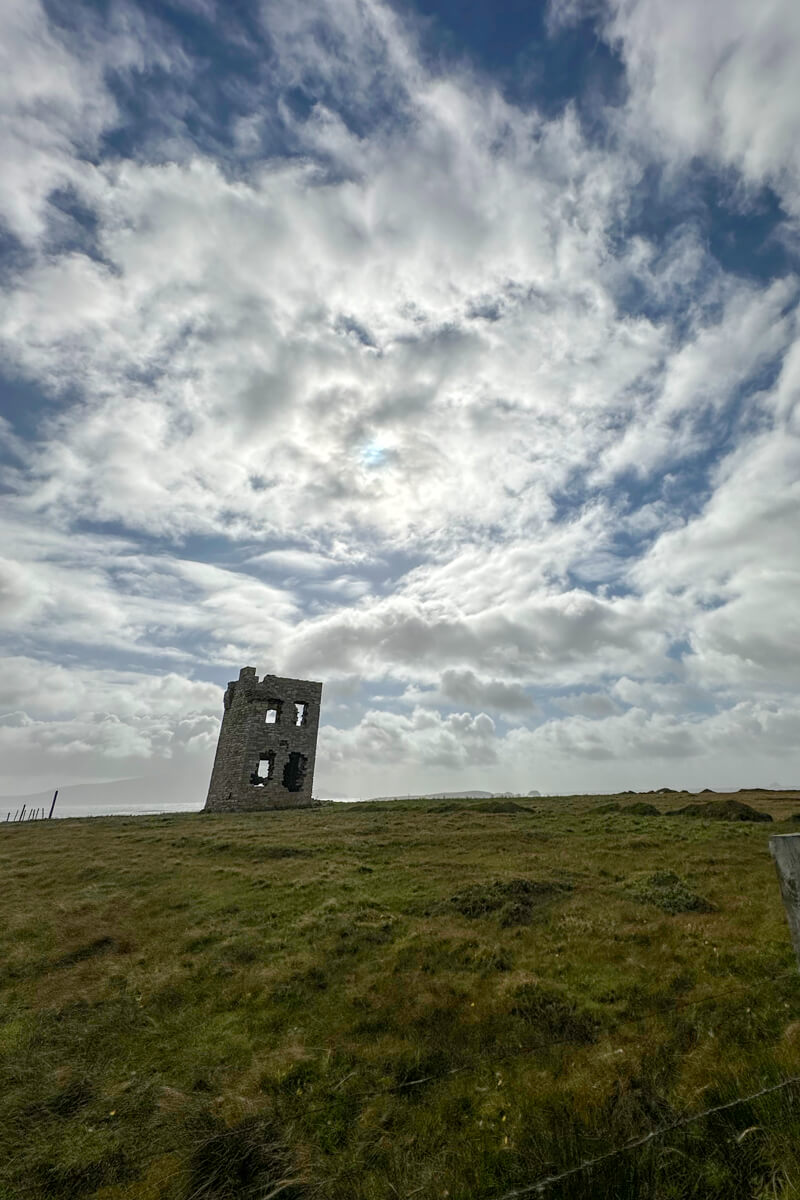
St. Deirbhile's Grave: Faith, Strength, and a Sacred Place
If Ireland has a gift, it's storytelling, and here in Fallmore, St. Deirbhile's Grave comes with one worthy of legend.
The landscape feels ancient the moment you arrive. The wind hums through tall grass, sea spray drifts from the cliffs, and the stone chapel ruins rise from the earth. It's just like they've been waiting centuries for someone to listen.
And then comes her story.
Saint Deirbhile's Story
Centuries ago, Deirbhile was a woman of deep devotion who sought solitude on this wild Atlantic coast. But word of her beauty spread far and wide, and one nobleman became obsessed. He followed her all the way here, declaring his love and refusing to leave until she agreed to marry him.
In true Irish dramatic fashion, Deirbhile asked him what it was that made him love her so fiercely. "Your eyes," he said. "They are the most beautiful I have ever seen."
So she did the unthinkable. To protect her vow and end his obsession, she took out her own eyes and offered them to him.
Horrified and heartbroken, the man fled. But when Deirbhile prayed for healing, she washed her face in a nearby spring, and her sight was miraculously restored. That spring became St. Deirbhile's Holy Well, and to this day, pilgrims and travelers come to try its waters.
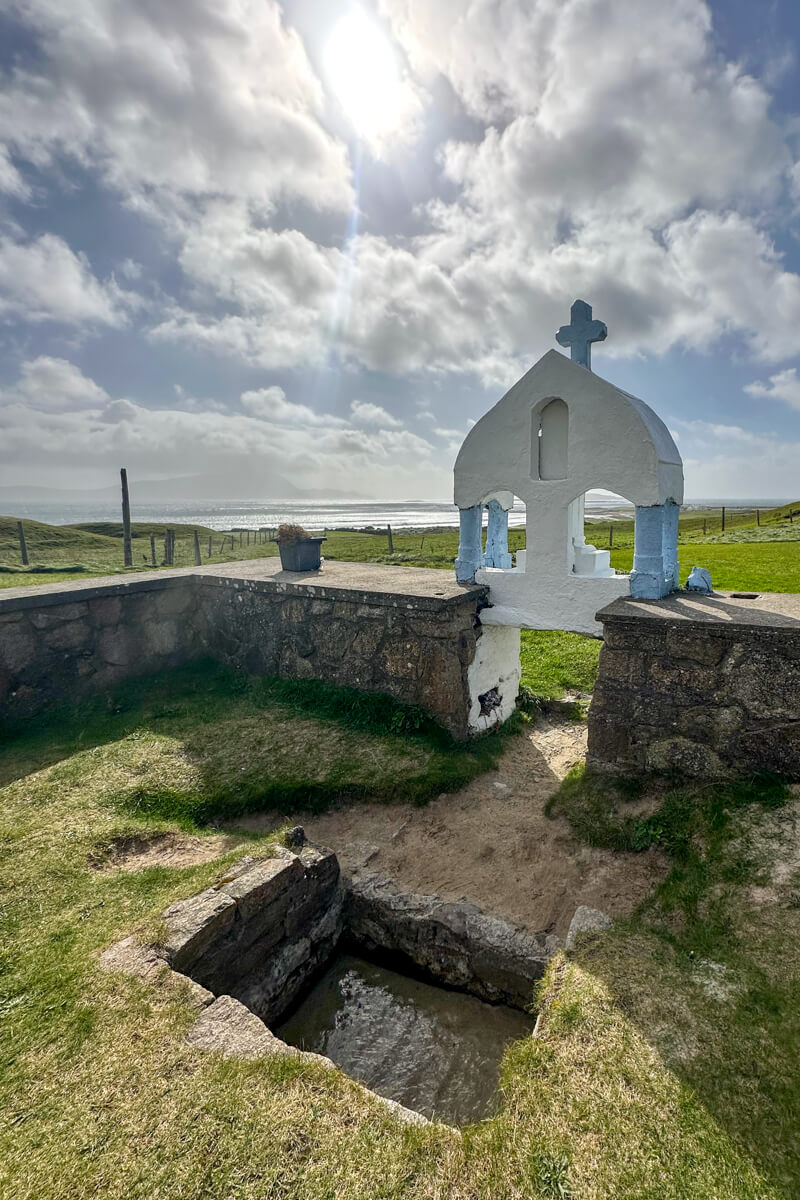
Naturally, we couldn't resist. Each of us took a sip, partly out of reverence, partly out of curiosity. And maybe just a tiny hope for a bit of saintly luck!
The water was cool, clear, and slightly metallic in taste. It might even make you pause and think, Well, if miracles happened once…
As I stood there, with the Atlantic wind tugging at my coat and the ruins behind me, it was easy to understand why this place has inspired faith for so long. There seems to be a sacred stillness in the air. It's a strength that lingers, like Deirbhile herself is still watching over this wild corner of Mayo.
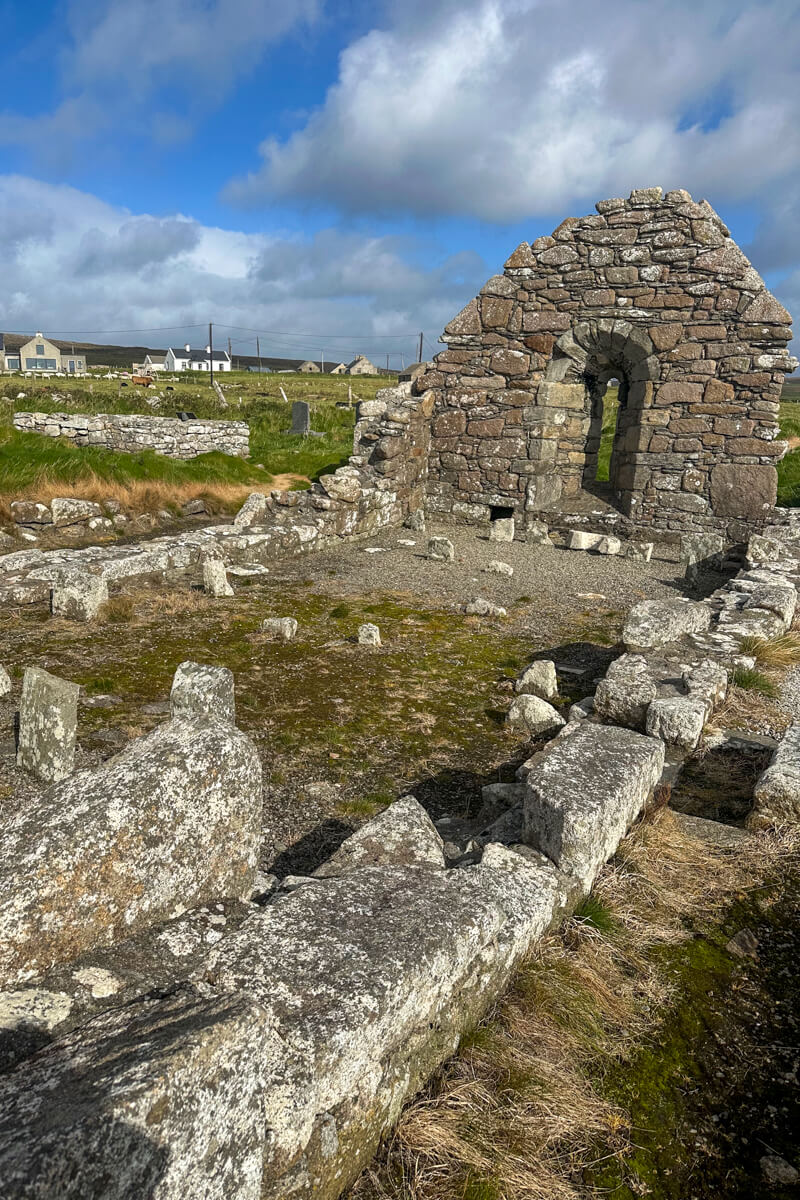
Blacksod Lighthouse: Weather, Wartime, and Wonder
By the time we reached Blacksod Lighthouse, the light was soft and golden, stretching long over the stone walls and the restless Atlantic. It's a sturdy little beacon, the kind that looks like it's seen everything, and, in a way, it has.
Once inside the lighthouse gates, Fergus began to tell a story that silenced even the wind for a moment. His grandmother had once worked right here at Blacksod Lighthouse, one of the keepers responsible for logging daily weather reports. It was a quiet, routine duty… until the summer of 1944.
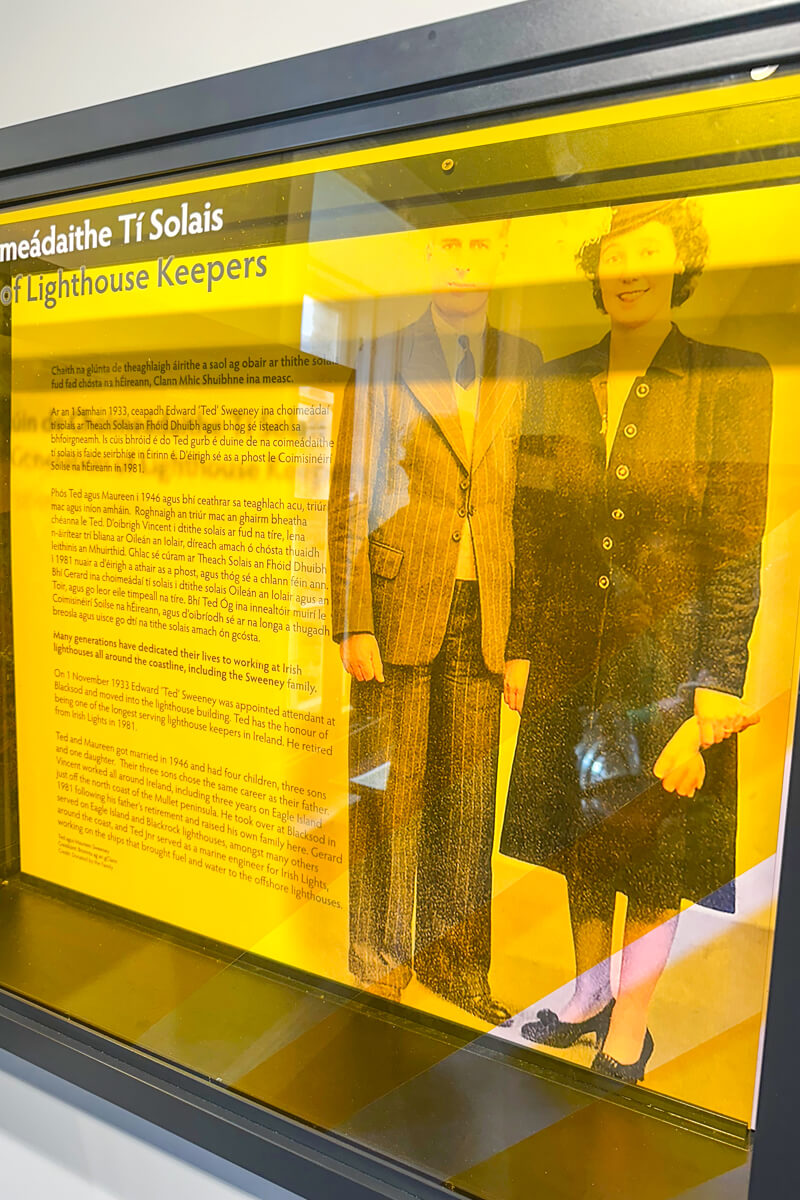
The Report That Changed D-Day
On a gray June morning, she sent in her report: rough seas, rising winds, a storm brewing in the Atlantic. Simple facts, written down with care, but those words reached far beyond this small corner of Mayo. They traveled across the ocean to General Eisenhower's desk.
And because of that weather report, the D-Day landings were delayed by twenty-four hours.
It gives you chills, doesn't it? One woman on a stormy Irish coast changed the timing of one of the most significant days in modern history.
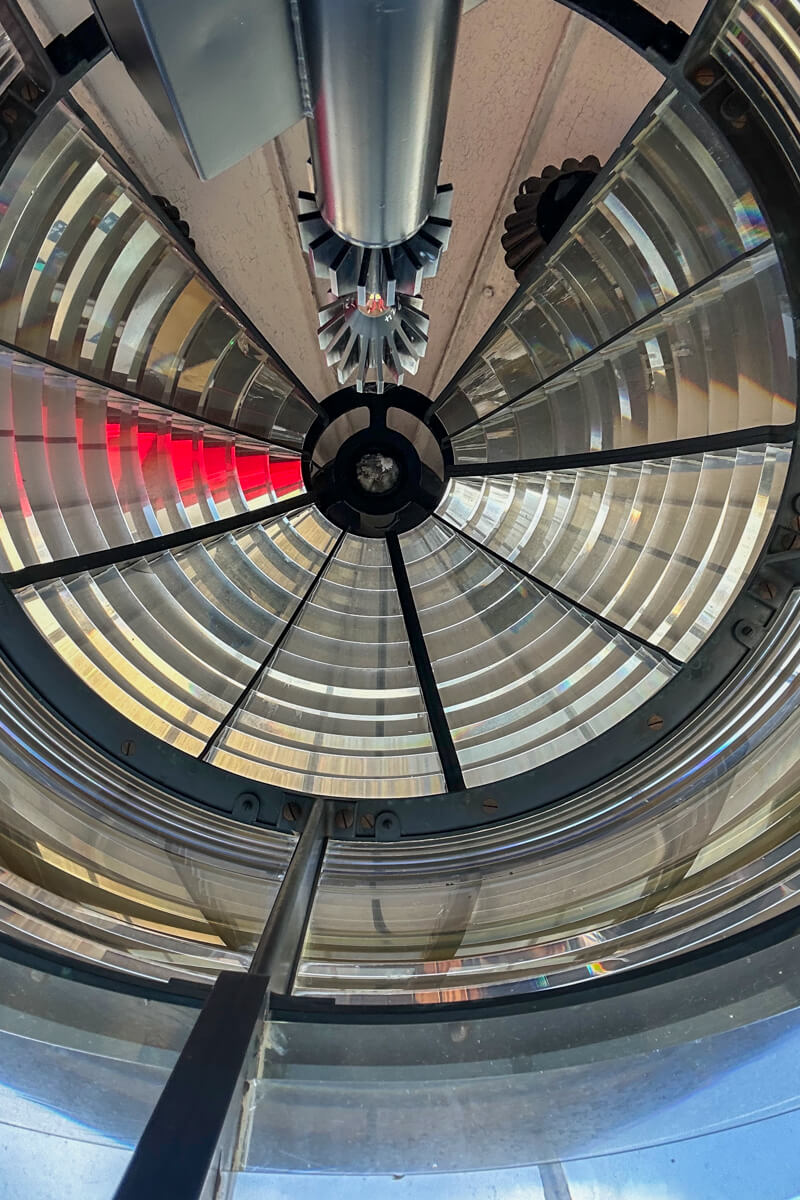
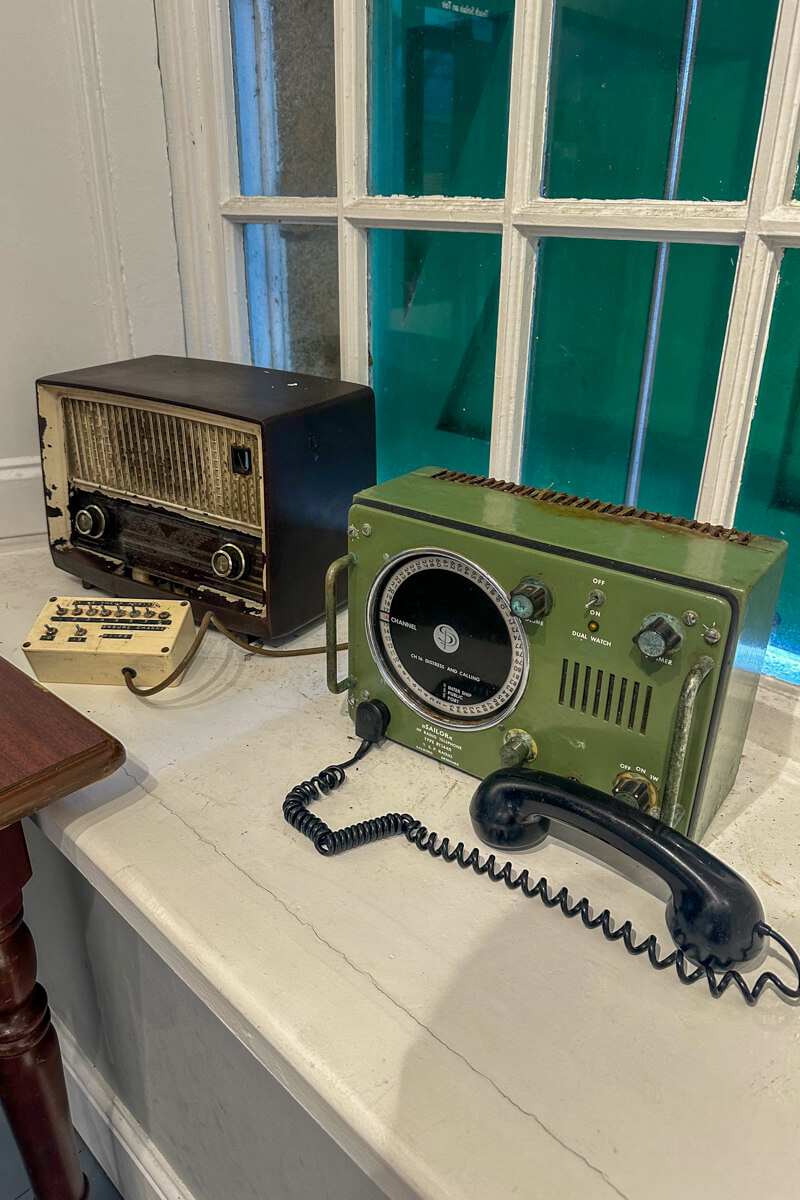
As Fergus spoke, I couldn't help but think about my own grandfather, who landed at Omaha Beach on D-Day. Two people, two coasts, two lives, unknowingly connected across an ocean and a moment in time.
It was one of those realizations that stops you in your tracks. Just think how small the world really is, how threads tie us together in ways we may never fully understand.
There's so much to this story, too much for one section of a travel post. I told Fergus he should write a book about his family and the incredible history of this place. He smiled and said with a grin, "Ah, it's on my list of things to do… eventually."
Something tells me when he does, it'll be a book worth reading.
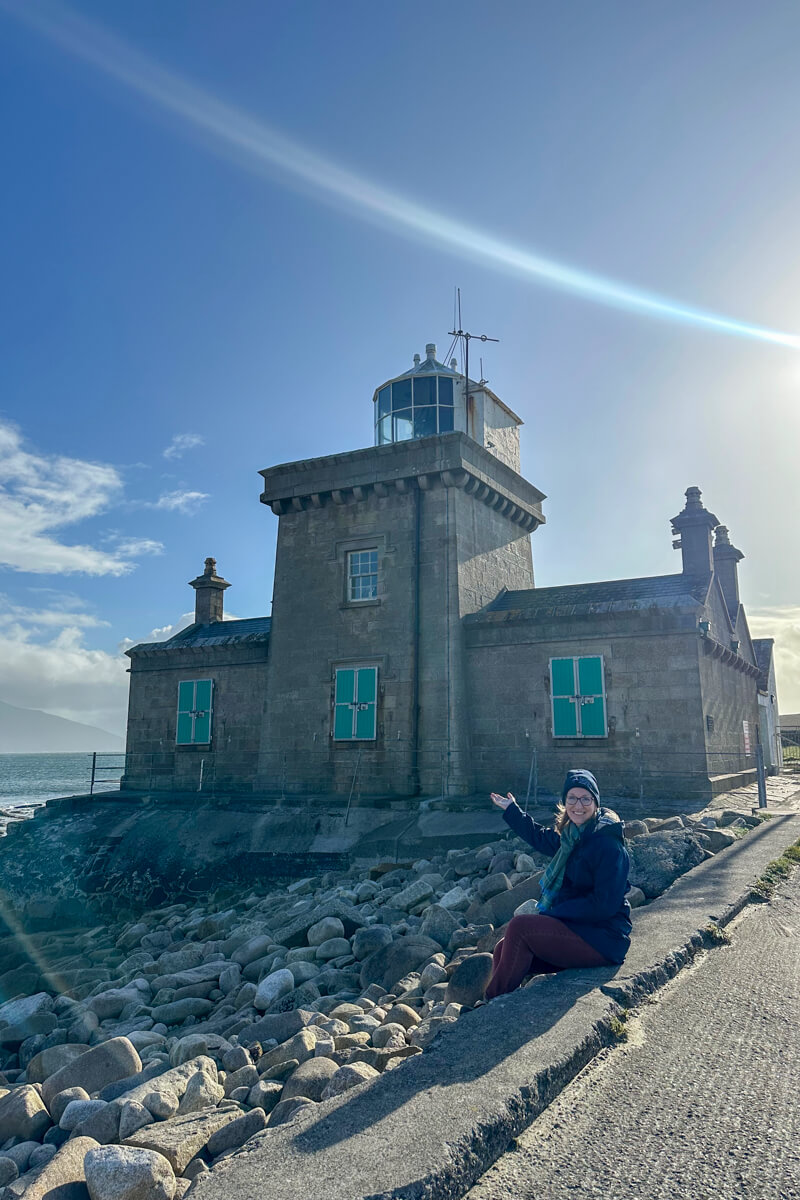
The Inishkea Islands, Waiting for Next Time
Though the wind kept us grounded this trip, I'm already planning to return for a boat trip to the Inishkea Islands. Boats depart regularly for the islands, and visitors often spot dolphins and whales along the way.
Everyone I spoke to couldn't say enough about them. They have white beaches, turquoise waters, puffins, and the haunting ruins of an abandoned village. Elly Bay, known for its pristine sands, is also nearby and offers activities like sea angling and surfing.
Sometimes, the adventures you don't take make the next trip even sweeter.
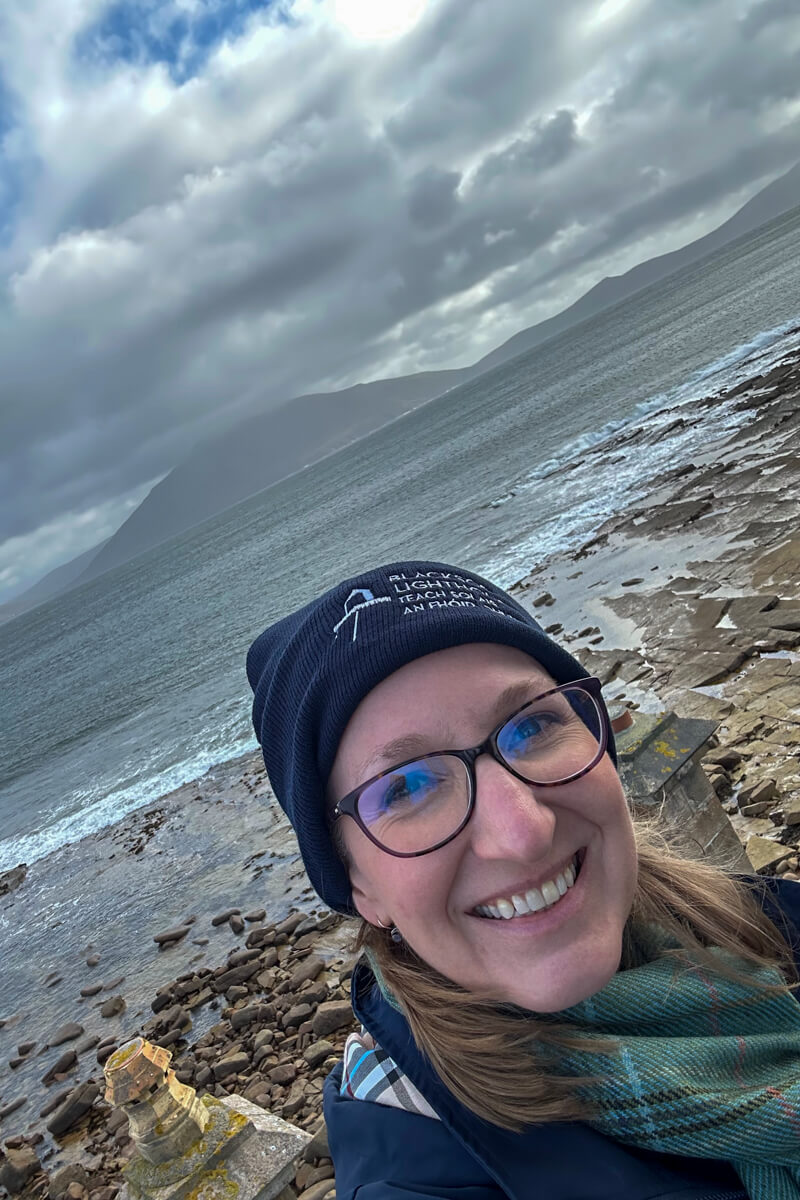
Reflections: Windswept, Grateful, and Ready for More
As the sun dipped low over the Atlantic, I realized the Erris Peninsula had quietly worked its way into my heart.
This corner of Mayo is untamed but welcoming, full of stories, songs, and surprises. It's no wonder the Irish Times named it one of the best places to go wild in Ireland. They recognized its unique appeal and natural beauty. It leaves your cheeks flushed, your camera full, and your soul feeling lighter.
Sure, the wind can rearrange your hair (and your plans), but that's part of the charm. In Ireland, the journey is never exactly what you expect, and that's precisely what makes it unforgettable.
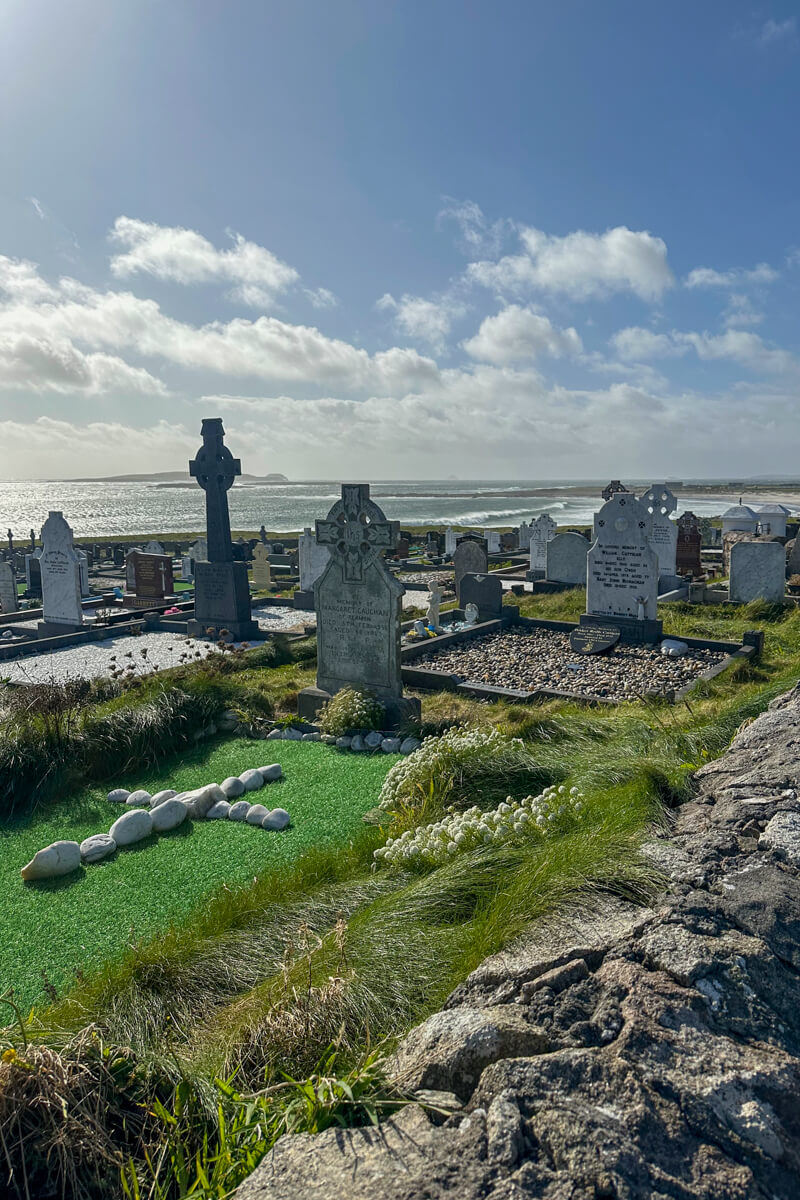
Practical Travel Tips
🚗 Getting Around: A car is essential. The drives between sites are half the fun, and yes, you'll want to stop for photos every five minutes. For a particularly scenic experience, take the driving route to Belmullet, which offers beautiful views along the way.
☕ Best Warm-up Stops: Solas Visitor Centre or The Talbot Hotel for tea and warmth. Also, McDonnell's Pub is a super friendly place to warm up and grab a pint. Many of these amenities are conveniently located along the main street.
📅 When to Visit: Late spring through early autumn. Always check weather and ferry conditions if you plan to visit the Inishkea Islands. August is peak summer season and probably the most crowded.
🌧️ Pack For: Layers, waterproofs, good walking shoes, and a cheerful attitude toward weather mood swings.
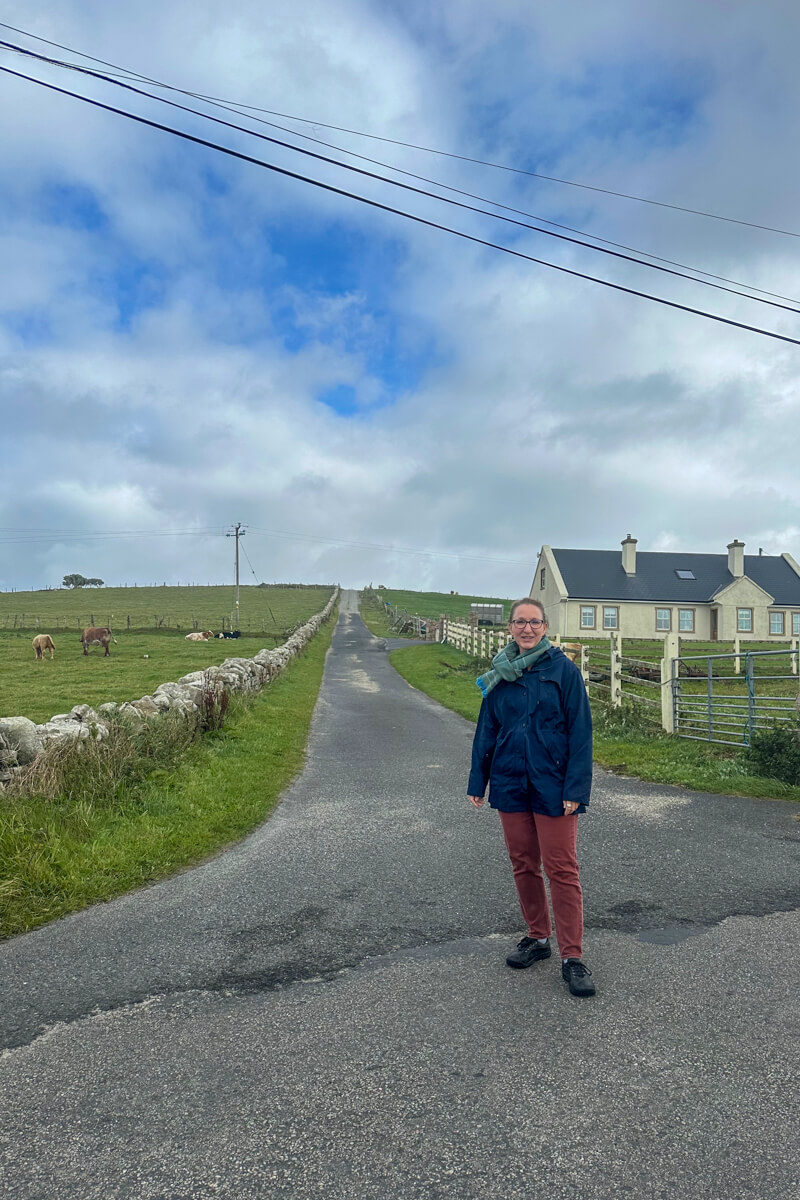
🏝️ FAQs: Everything You've Wondered About Belmullet and County Mayo
Curious about Belmullet and the wild beauty of County Mayo?
You're not alone! I've gotten a lot of questions about this windswept corner of Ireland since I got back. Whether you're planning your own Wild Atlantic Way tour or just day-dreaming about Irish cliffs and cozy villages, consider County Mayo. It's an unforgettable part of the Emerald Isle.
Is Belmullet worth visiting?
Oh, absolutely, a thousand times yes! Belmullet is one of those places that sneaks up and steals your heart. It's a cozy coastal town perched on Ireland's Wild Atlantic Way, bursting with local charm, warm pubs, and spectacular views. It's also the perfect base for exploring the Erris Peninsula. Visit the tidal pool, lighthouses, and windswept beaches that look like movie sets.
What Irish surnames are associated with County Mayo?
You'll spot plenty of classic Irish surnames here; O'Malley, O'Donnell, Gallagher, Burke, and McHale are among the most common. The O'Malleys, in particular, are legendary. Yes, as in Grace O'Malley, the fearless pirate queen who ruled these coastal waters long before "girl power" was a hashtag.
What does the name Belmullet mean?
The name Belmullet (or Béal an Mhuirthead in Irish) roughly translates to "the mouth of the isthmus". It perfectly describes the town's location, tucked between two bays where the Atlantic practically knocks on your door. A fitting name for a place so connected to the sea!
What is the population of Belmullet, Mayo?
Belmullet is delightfully small, with around 1,000 residents. However, what it lacks in size, it makes up for in heart, hospitality, and plenty of good craic (that's Irish for fun and laughter).
What is Belmullet famous for?
Belmullet is famous for its stunning scenery and position along one of the wildest stretches of Ireland's west coast. Outdoor lovers adore it, surfers, golfers, hikers, and anyone who loves the feeling of wind in their hair. It's also home to Carne Golf Links, lively traditional music sessions, and some of the friendliest people you'll ever meet.
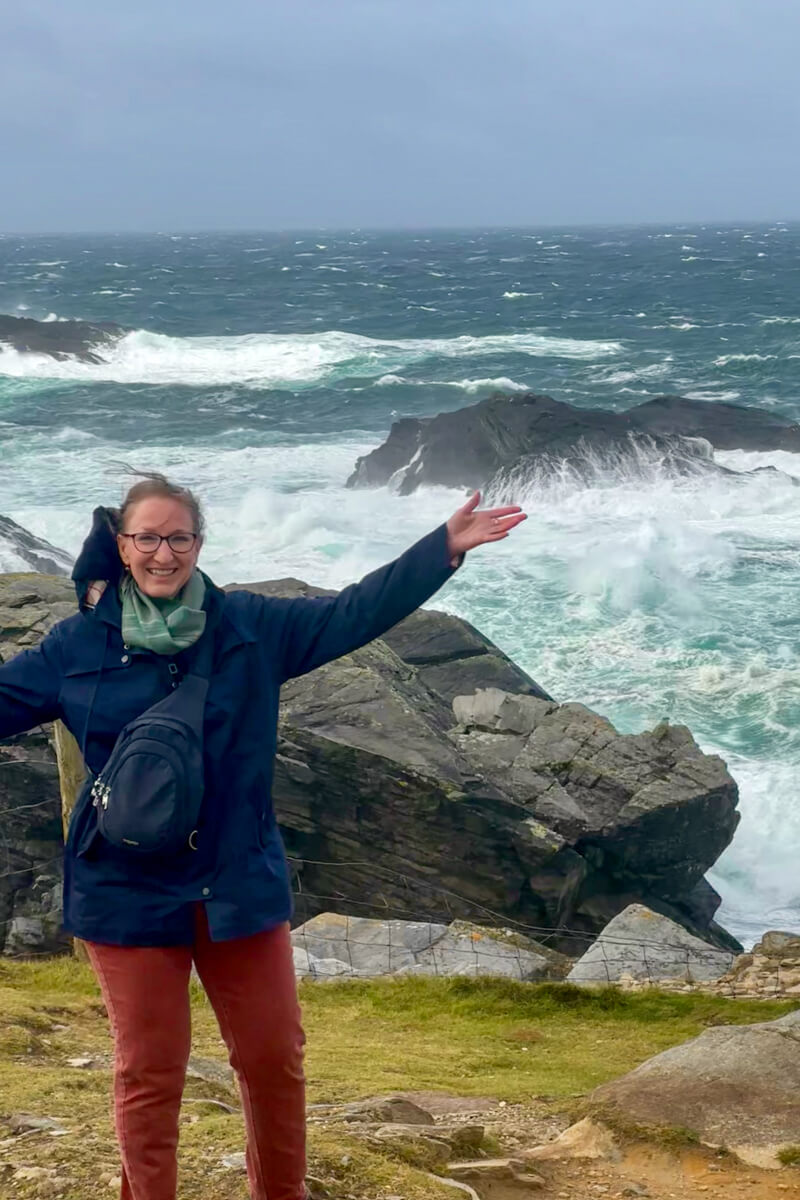
What does Belmullet mean in English?
In English, Belmullet means "mouth of the Mullet (Peninsula)," describing its perfect position between Broadhaven Bay and Blacksod Bay. Romantic, right? Geography meets poetry.
What is the largest city in Mayo, Ireland?
That would be Castlebar, the county town and Mayo's vibrant capital. It's a great spot for shops, cafés, and cultural events. Indeed, a handy base if you're setting off on day tours around the west.
What is County Mayo, Ireland famous for?
Mayo is famous for its rugged Wild Atlantic Way coastline, Croagh Patrick (Ireland's sacred mountain), and Achill Island, home to breathtaking beaches and cliffs. The historical lands of County Mayo have played a significant role in Ireland's past and added to its rich heritage, folklore, and Gaelic culture. It has an atmosphere that makes locals and visitors alike feel instantly at home.
What is County Mayo in Ireland known for?
County Mayo is known for its unspoiled beauty and authentic Irish experience. From megalithic tombs and ancient history, to friendly villages, lively pubs, and unforgettable cultural experiences.
Notable historical and cultural sites in County Mayo include the Céide Fields, an extensive Neolithic site, and the iconic Croagh Patrick pilgrimage site.
What's Next? Continue Your Wild Atlantic Way Journey
Ready to explore more of Ireland's west coast?
📖 Start with Part 1: Wild Atlantic Mayo, From Ancient Fields to Sea Cliffs for history and hidden gems.
Then discover Part 3: Exploring Achill Island: Language, Land-Sailing, and Sea Adventures.
Pack your curiosity, a raincoat, and maybe a sense of humor; the Wild Atlantic Way is waiting! ☘️🌊
Pin it to read later here:
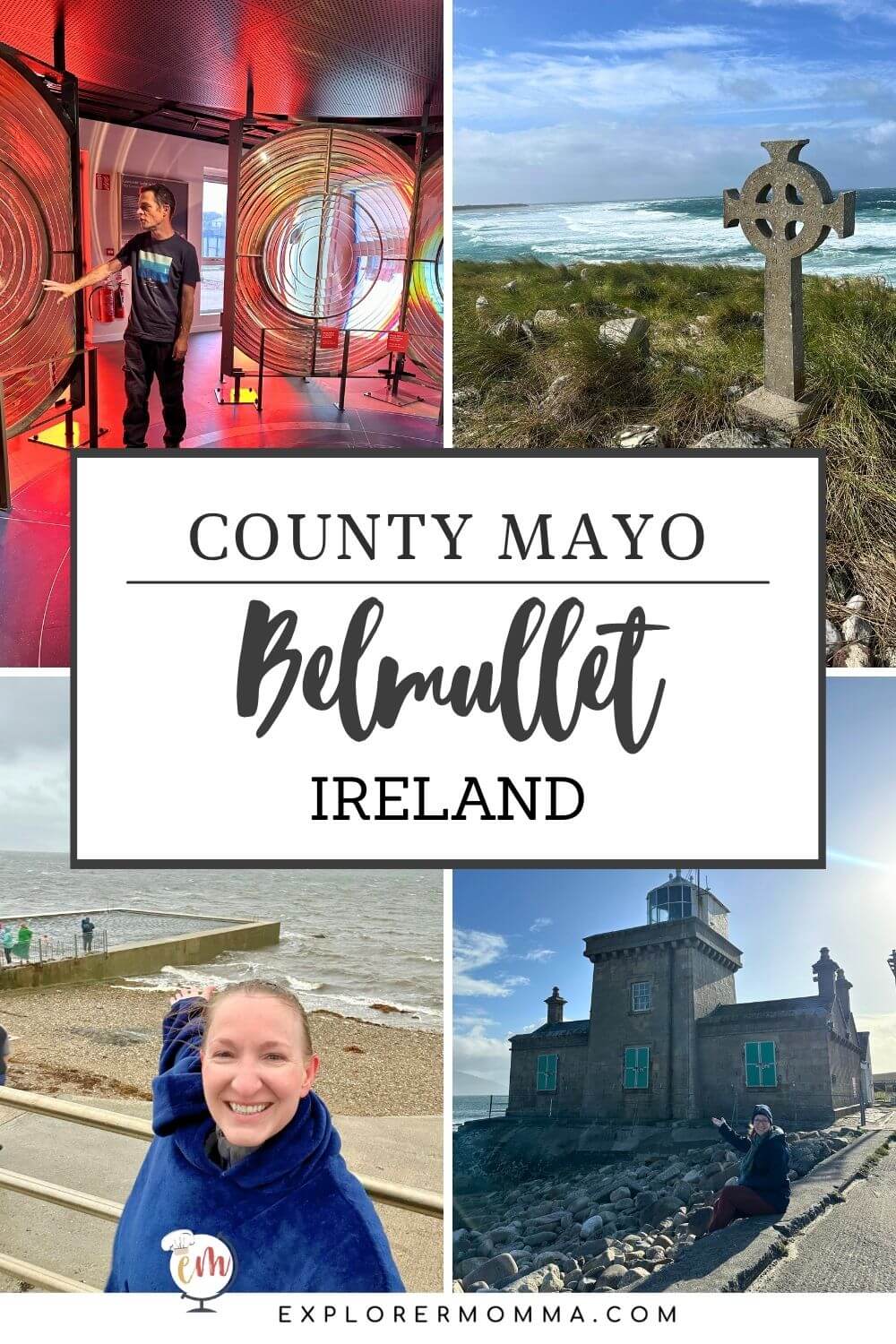

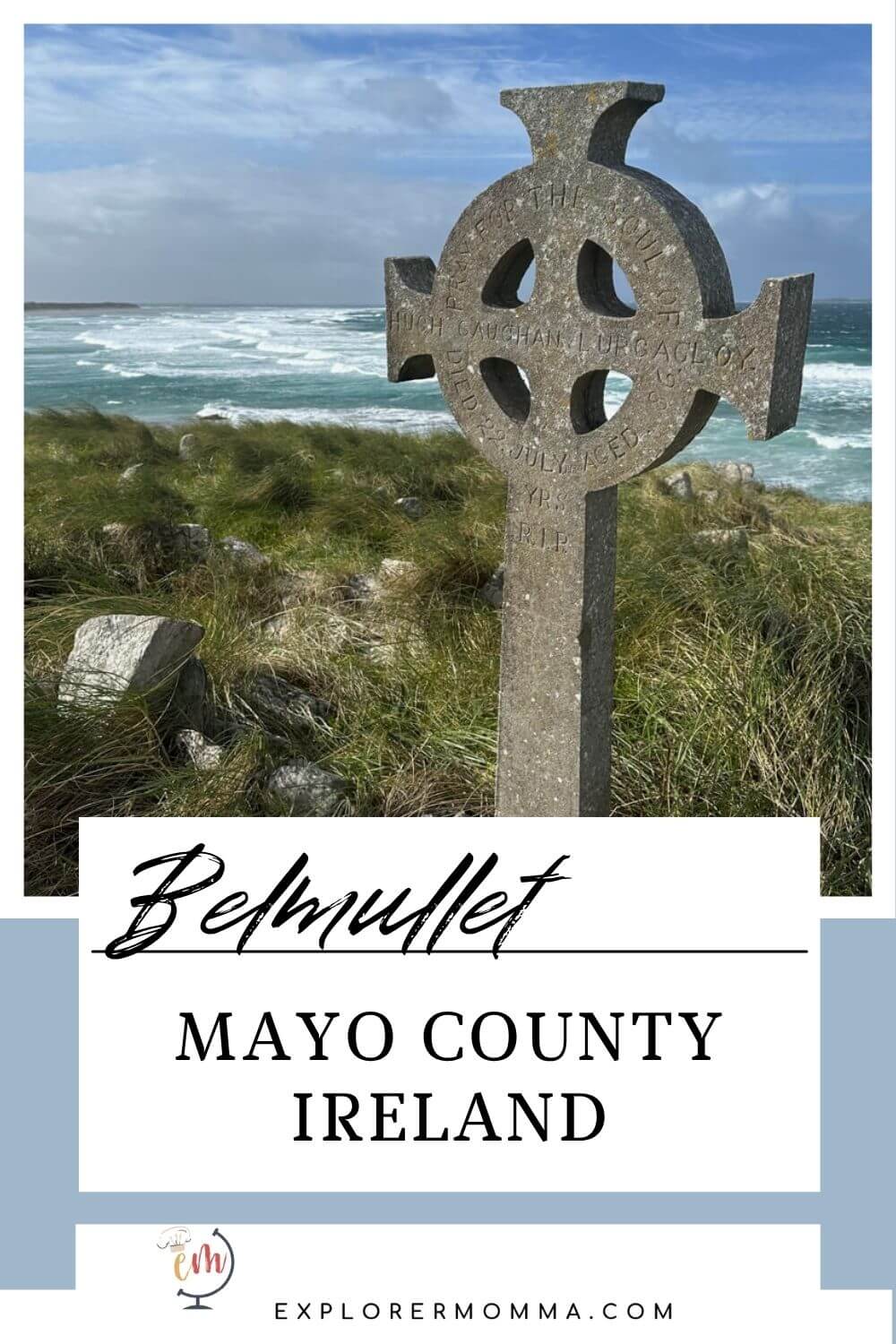
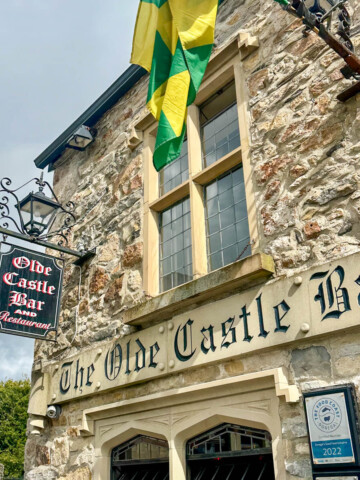
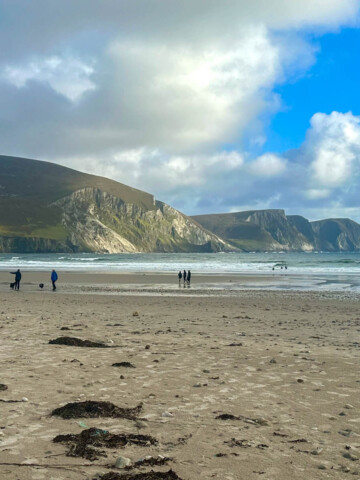
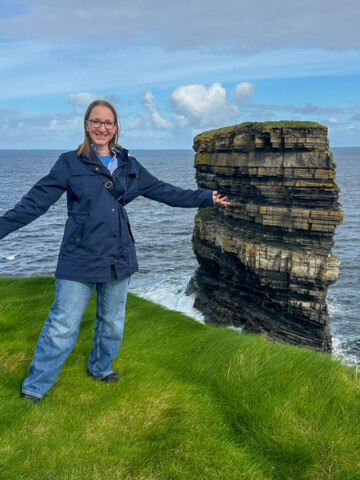
Lavon Burton says
I can almost feel the chilly breeze and the sea water lightly spraying my face!!! What awesome views, scenic towns, and so much more, I know! You are such an expert guide!!!
Lauren says
Thank you! It was a wonderful experience, and I would love to go back! Ireland is a magnificent place.